Part 7 -
More Heroes of D-Day
Story written by Rick
Archer
|
|
Captain Joe Dawson
being awarded
the DSC by General Eisenhower
|
Sergeant Phillip
Streczyk |
Streczyk
being awarded the British DSO by
General Montgomery |
Lt John Spalding
being awarded
the DSC by General Eisenhower |
|
|
|
One day I ran
across a passage in a book titled Power Play
that touched directly on my sensitive nerve about courage.
Power Play
Written by Joseph
Finder
Russell:
“Jake, my man, the great tragedy of this century is that
a man can live his entire life without knowing for sure
if he is a coward or not.”
Jake: “Huh.
Never thought about that before.”
Russell:
“You know what’s wrong with the
world today? Computers. They are ruining the
human race.”
Jake:
“Computers?”
Russell:
“You ever see elks mate?
Jake: “Never
had the pleasure.”
Russell:
“Every fall the female elk releases this musk in her
urine. That tells the bull
elks that she is ready to mate.
The bull elks
can smell the musk and they start fighting each other
over the female. They charge at each other, butting
heads, locking antlers, making this unbelievable racket,
this loud bugling. They fight until
one of them gives up and the winner gets the girl.”
Jake: “I’ve
seen bar fights like that.”
Russell:
“That’s how the females can tell which bulls are the
fittest. They mate with the winners. Otherwise the
weak genes get passed on and the elks are gonna die out.
This is how it works in nature.”
Jake: “Or
the corporate world.”
Russell: “No,
that’s where you are wrong. It doesn’t work like that with
humans anymore. Used to be a human who was too slow got
eaten by a Saber tooth tiger. Natural selection, right?”
Jake:
“Didn’t the saber tooth tiger go extinct?”
Russell:
“These days everything is upside down. Women don’t mate
with the better hunter anymore. They marry the rich
guys.”
Jake:
“Maybe the rich guys are
the better hunters now.”
Russell: “Bullshit.
It’s like Darwin’s law got repealed. Call it the
Rule of Weak.”
Jake: “Okay.
Please explain.”
Russell: “Do
you think women can tell which men are the fittest
any more?
Hell no, they can’t!
The women don't
even know where to start.
You see a guy
who is really cut and buff.
He's wearing a muscle shirt to show his body off
and you can figure he spends all his time in the gym.
But you know something? Odds are he’s a faggot. Girl
sees him, thinks she’s in love and hasn’t got a clue
this guy has no desire to reproduce.
I mean, look
at the guys in this picture. This country was made by guys like
Kit Carson fighting savage Indians with knives and six
shooters. Hand to hand combat. Those were brave men.
But that’s all gone now.
The world
today is
run by a bunch of fat-assed wimps who only know how to
Double Click their way to power.
Some
pencil-necked geek sitting at a computer can launch a
thousand missiles with one finger. He kills a million
defenseless
people and
somehow deludes himself into
thinking he's a real tough guy.
Thinks he
should get a Purple Heart for a paper cut.
His idea
of Power is Powerpoint.
These jerks have
headsets on their heads, fingers on
their keyboards
and think they are Macho men when they are really
just half wimp-half machine.
What a crock
of shit.
|
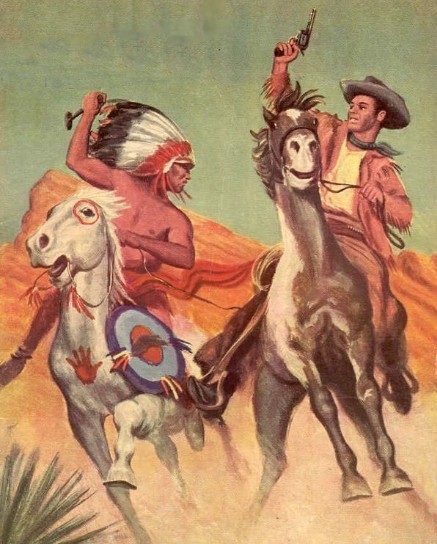 |
They’re
nothing more than sports drink gulping, Instant message
sending, mouse clicking, ipod listening, web surfing pussies.
I am positive that God didn’t mean for the likes
of them to run this planet on the backs of real men.
The problem is, most of the real
men are gone. And
why is that? Because the goddamn
natural selection process has been turned
upside down. The guys who run the country
today think they are fighting men,
but they would beg for their
Mommies if you pulled a knife on them. They go
hunting on the weekend to prove they are men
and kill unsuspecting animals from hundreds of yards
away. That isn't manhood. Any coward could do the same
thing. Those sissies would run screaming
in terror if a
deer had a gun to shoot back with.
Here's the way I see it. The people
in power today are the sons of the wimps who were
sucking their thumbs and puking their guts out
at the back of
the boats headed to Omaha
Beach on D-Day. After
they staggered off the boat, those cowards
spent the entire goddamn day
hiding behind dead corpses on the
beach. Their
idea of courage was giving themselves a
flesh wound in the leg.
Those
pukes had a bird’s eye view of
the last real men as they went down
in agony fighting for
their country. One by one, those
brave men faced near-certain death as they
ran straight into machine guns on that stinking
Omaha beach. They made the
ultimate sacrifice so the world could get rid of
Hitler and the people they loved back
at home could be safe from that monster.
Meanwhile the sniveling cowards never
lifted a finger to fight the enemy.
Instead they dug
holes in the sand, played dead and
got up when no one was
looking. They went on to
reproduce the
same wimps who run
our country today.
D-Day was the
day that Darwin’s Law died. From then on, it was
Survival of the Weakest.”
|
Strong words, yes?
There is no doubt that many men
my age have never been tested thanks to the brave soldiers
of World War II.
Their sacrifice at D-Day meant that
people like me would probably
never see combat during our lives. Thanks to the countless
men who died in great pain with Nazi bullets ripping their
bodies to shreds,
I have been given
the chance to sit here in the comfort of my home writing
stories at my computer. My mind has trouble accepting
the full extent of the sacrifice.
"These jerks have
headsets on their heads, fingers on
their keyboards
and think they are Macho men when they are really
just half wimp-half machine."
Considering most of my free time is spent
typing away on a keyboard, Mr. Finder's comments cut
straight to the edge of my survivor's guilt.
I hope I am cut out of a stronger cloth than the
double-clicking keyboard pussies of the tirade above, but I
will probably never know. I definitely think Mr.
Finder raises an interesting question:
Would the men of
today have the same courage as the group known as America's
Greatest Generation? Or have we grown too soft?
|
| |
|
The American Cemetery at Normandy is the final resting place for
nearly 10,000 men who died fighting in Europe. The vast
majority of the graves belong to men who died fighting during the
Normandy invasion and during the brutal fighting that took place
throughout France in the month following the invasion.
It is a very humbling experience to see all those graves and
understand these men gave their lives so the rest of us could enjoy
freedom and prosperity.
|
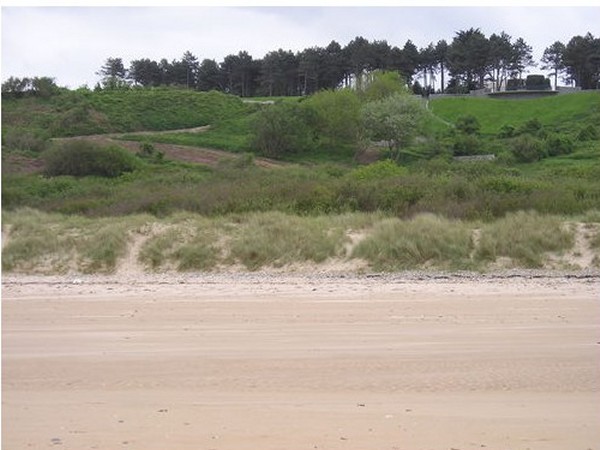
I
photographed the following 30 pictures during my visit. Here
you can see
how the terrain rises. The Platform on the ridge of the hill
is 200 feet above the beach and 700 yards from the
water's edge. The Cemetery and the Platform are side by side.
|
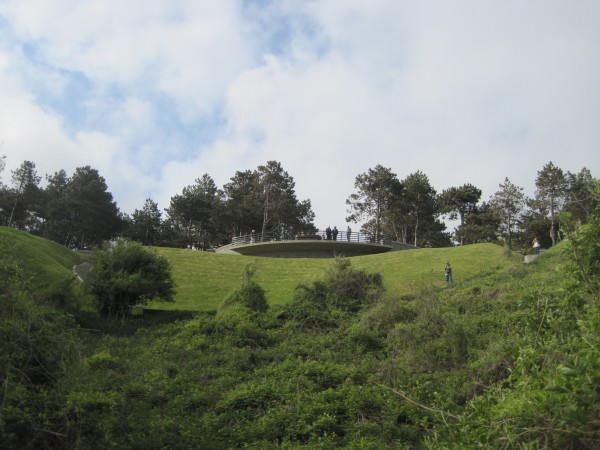
Notice the
woman walking down stairs. There is a walkway directly in
front of that Platform with a staircase on either side.
This curving walkway creates the white Semi-Circle that I
used as a landmark in the Google Earth picture above.
|
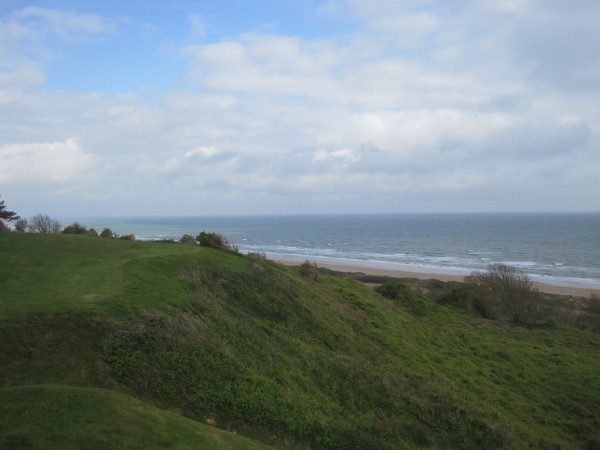
As you stand on the Platform
looking out to sea, this is the view to
the left of
the Platform (due west). That is Omaha Beach below.
|
This is the view to the east
of the Platform. You can see the steps that begin one side of the
curving walkway below, i.e. the semi-circle.
|
This is the view
directly in front of the Platform. That little dot on the beach is a
man walking half a mile away.
The mine fields and the
barbed wire were down by the marsh area at the bottom of the hill.
The deadly machine gun nests were located about 100 yards from the
shore. On D-Day there was artillery mounted in the exact spot
where the Platform is now positioned.
As you can see, this
area is beautiful. I don't know if any German or
American ghosts still linger here, but it is definitely a quiet,
peaceful place today.
The Platform had
a very commanding view. The slope on either side of the
Platform is much steeper, creating a bowl of sorts. If you are standing on the
beach, the easiest route to the top of the hill is the view in this
picture.
There is a secret about
the Platform and Cemetery that no one told me about. While
researching this article, I got goose bumps when I realized this
exact spot was the site of the initial breakthrough on Omaha Beach.
When I took this picture, I was standing right where Spalding,
Dawson, and Streczyk made their heroic penetration.
|
|
|
|
|
|
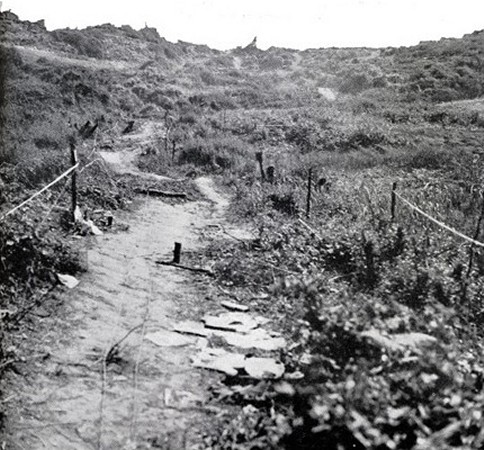
You are looking at two
pictures of the same spot. This is a picture of the exact
trail that Spalding's men took on their way to the top. As you
can see, there isn't much up there to fear. However, this
picture was probably taken AFTER Spalding and Dawson's companies
eliminated the German defense.
|
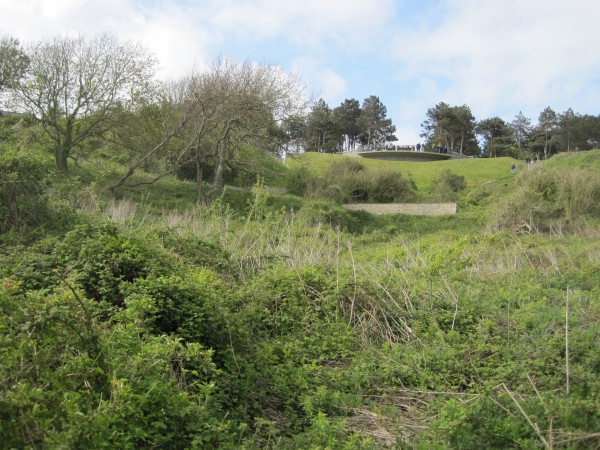
As I said earlier, I
assumed there were massive fortifications atop the hill. What
I did not realize is that the Germans did not have the manpower to
put guns everywhere. They had to pick their spots. So
why was this area relatively undefended?
|
He [the gunner on the slope above Easy Red] is in a one-man foxhole and
he’s shooting like hell. Finally, we get around behind him. He only
threw up his hands when we got behind him and put a gun to his head.
[Laughs] That’s when he finally found out he was Polish, started talking
Polish.
He says, “I got captured, I don’t want to shoot!” One-man foxhole and
shooting like crazy! Streczyk talked to him in Polish and he got so
crazy with him he punched him. “What the hell are you doing?” Pow!
vinnie digaetano
Phil Streczyk
Everybody reacts different to combat. There are some people that can’t
take it and some people just let it go, you know what I mean? It’s
hard…How somebody’s mind works really. In a million years, you’d never
think that Streczyk would be one of the guys who cracked up, but there
you go, you never know.
He didn’t crack up until the Hürtgen forest. And when you see that…
I think he was one of the most highly decorated soldiers in the
army. He had a lot of awards. He had everything but the Congressional
Medal of Honor.
The war's long effects: Vinny and Chris DiGaetano in conversation
Vinny’s wife Chris joined the conversation and I’ve transcribed their
words as faithfully as possible (and omitted my questions as it slowed
down the text).
Chris: Vinny never really did spoke about the war. Maybe he’d joke. But
he had nightmares, he really did.
Vinny: In the beginning, yeah…
Chris: He had a lot of nightmares. In the middle of the night, all of a
sudden you’d find him sitting bolt upright, angry as all hell, and you
think he’s awake but it’s in his subconscious. We were up in Times
Square, and we were walking up in the theater district, by the
Paramount, and a truck backfired. I was walking along and—where the hell
is he? He had run behind a car, like we were being bombed. He was down
on his hands and knees. I didn’t want to embarrass him. And I said,
“It’s just a truck, Vinny.” You know, it’s sad. Because he’s like the
strong one and to see him crumble was sad.
Vinny: My first job was in printing shop. They cut the paper, it goes
zzzzooooowwhhh. Sounded just like when you’re getting artillery fire. I
start diving underneath the table. So a guy says, “So you were in the
infantry.” He said the first couple times he heard it, he was diving
under the table too. He said it takes about a week and a half to get
used to that sound.
Chris: Vinny’s cousin was with Special Services. They made recordings.
And he came [to a family gathering] with this record of the Screaming
Meemies and he wanted Vinny to hear. It was when we were first married.
We didn’t even have children yet.
Vinny: Oh, yeah…
Chris: And Vinny’s sitting there. All of a sudden he was like, “You
gotta stop it, you gotta stop it soon because I’ll kill him and I’ll
break the machine.” I said, “What? What happened?” He said, “That’s the
noise I heard!”
Vinny: I hate those Screaming Meemies. You could hear them for miles
away. yooeeerrrrrrrrrrrrrrrrrr…then you don’t hear nothing.
Chris: And then there’s an explosion.
Vinny: It wasn’t like an artillery shell, you could hear them coming in
[all the way]. But we called them Screaming Meemies because we’d hear
them— yaaahhhoowwwweeeeerrr—
Chris: Then silence and then boom.
Vinny: Then it blows up, bowwwrrrrrmmm, because they were like bombs. I
used to hate the noise.
Chris: And this cousin thought it was so, wow, look what I got. He got
such a charge out bringing all those war sounds. “This is wonderful, you
have to hear this.” What the hell is he doing? And then Vinny blew,
“I’ll kill him!” You were really yelling that night. What was wrong with
him? Why would he record something like that?
Vinny: The Screaming Meemie guy, he was married to my first cousin.
Chris: He didn’t want to see Vinny after that. He said, “If that nut is
going to be there, I’m not going.”
Vinny: We never saw him after that. Once or twice maybe. Hardly ever.
Chris: I think your cousin divorced him eventually.
Vinny: Smartest thing she’s done probably.
Chris: That’s a shame, that one [Phil Streczyk] who committed suicide
after the war? I wonder if he ever got help. Because Vinny went for
treatment, for therapy, for eight or ten years, didn’t you, Vinny?
Vinny: Once a week. Kings County Hospital, I used to go. That’s a big
hospital, like Bellevue.
Chris: Psychiatric ward.
Vinny: It was good…
Chris: I think it helped. When he came back from those sessions, he’d be
laughing.
Vinny: The doctor would be like, “Did your father hit you?” “Yeah.” In
those days, if your father hit you it was nothing.
Chris: It wasn’t his father hitting him, it was the Germans. He’d come
back and say, “You should see all those crazy people hanging out the
windows.” I said, “You’d better keep going or you’ll be joining them.”
Maybe [Streczyk] didn’t go for treatment. Sometimes it does help when
you can talk man-to-man, someone who’s professional. They can help you
out. Vinny always used to give way to his outbursts. My mother used to
say, “Don’t get him angry because he’ll get away with it. He’s crazy.
He’s got it on the record that he’s nuts.”
Vinny: Her mother used to say, “Leave him alone, he’s crazy.”
[I asked Chris why she married Vinny despite the problems and her
family’s misgivings. She shrugged and laughed and said, “I thought he
looked like Robert Mitchum.”]
The citation for the British Military Medal states: “For gallantry in
action against the enemy on 6 June 1944 near Colleville-sur-Mer, France.
T/Sgt. Streczyk was one of the first men to enter the maze of trenches
and dugouts, and in desperate hand to hand fighting cleared out
compartment after compartment. In this fighting he captured an officer
and 20 enemy soldiers. He then, with complete disregard for own safety
and without assistance, assaulted and destroyed an enemy machine gun
nest. The heroic and courageous actions of T/Sgt. Streczyk were in
keeping with the highest traditions of the Armed Forces of the United
States.”
|
|
Stan Dzierga
The invasion, well, that was rough. There was a lot of noise….[Stan
shuddered.]
One thing I remember. They told us, when we hit the top of the ridge,
avoid the dry spots in the grass. That’s where the mines are. And that’s
what we did. I guess the grass was starting to dry or they just dug it
up and it didn’t take. And that’s what we tried to do. Avoid them dry
spots when we were walking.
I remember I said to Wally, “Look at those guys running across the
field. Those must be our guys.”
He says, “Hell, no,” he says, “They’re not our guys. That’s got to be
Germans.”
We didn’t have any overcoats on. They had overcoats on and they were
running across the field from the beach we were on. We just made the top
of the ridge and some of them were going back. The Germans were falling
back there.
And the hedgerows were tough. You didn’t know what to expect. And then
you had snipers in the trees. That’s I think how Bisco got killed.
Poor guy, I’ll tell you. What a nice guy. Soft-spoken.
I just…he was right next to me….[Shudders, shakes it off]
|
|
walter bieder
We were ten miles out in the water when we left the ships. And it was
really rough that day. We debarked from the ship by a rope ladder that
came down the side. A couple of guys went down first to hold the ladder
steady when we were coming down. And when you’re coming down, the boat
would be coming way up in the water and then all of a sudden it would
drop down. We finally got everybody aboard, but it was rough.
When we left the mother ship we went out a ways and the landing craft
circled. You have a navy boat there, a navy officer to guide you, to
give you the go to go in. We were all out there circling around waiting
for everybody to get ready, bouncing around there getting soaked, and
guys were puking left and right.
Finally the navy guy said okay and we started and we all spread out and
went in a line until we hit the beach. H-Hour was 6:30. We left the
ships about 3:30 in the morning. So it took about three hours to get in
there.
When we hit the beach, we were the first wave in. The coxswain we had on
our landing craft, he was good. He run the boat up as far as he could
and hit a sandbar or something and said, “That’s as far as I can get
it.” And Spalding said lower the ramp. So we lowered the ramp and jumped
out. First thing, whoop, the water come way up. So we had to wade in and
then crossed a long beach because the tide was out.
The 4th Section of our company, when they lowered the ramp, cross fire
right in there. Four guys got out of that boat alive. They were at the
rear of the landing craft. One of them was a buddy of mine, Cordell. He
told me they jumped over the side, into the water. That’s how they got
out of there.
Our platoon, Spalding’s platoon, we made our way up the hill and kept
pushing. We were sort of spread out. There were a couple of other guys
around me. One guy’s name was Piasecki.
I hit this machine gun nest. It was set not on top of the hill, but just
a ways down and dug in. I had a grenade launcher on my rifle. It was an
armor piercing grenade, but not like a hand grenade. See, the regular
hand grenade we called a pineapple. It was smaller and you had to pull
the pin on it. The grenades that I used, when you fired, it
automatically set off the mechanism in the grenade to explode on
contact.
Our first platoon got up there and I got that one machine gun nest. I
fired at it twice and the second time I hit it.
Farther up, in a little ravine, was a small anti-tank gun and I aimed at
that and I hit that. And then my rifle, I don’t know what the hell
happened with it, the mechanism fell apart, and I had to grab a rifle I
found laying from one of the guys that was hit.
We started taking German prisoners and took a bunch down to the beach.
Then we went right back up and joined the rest of our section. That’s
when Spalding said, “Let’s go.” And so we started pushing back further.
We thought we had elements on our left and our right. But we didn’t. We
were out there alone. And we got caught in a hedgerow.
The hedgerows were square, and thick as hell. They pinned us down in a
hedgerow and they caught us flat-footed. We were there firing back at
them but we couldn’t move because they had us pinned with machine gun
fire. And our forces down on the beachhead didn’t know we were out
there. And the navy was shelling, and we were catching navy shells also.
We didn’t have no communication. From what I remember, our radio man was
knocked or something, I can’t remember. Anyhow, we had no communication
that we was out there. And for the whole day we was pinned down out
there in this hedgerow. They had us really pinned because they had cross
fire and you had to lay flat right up against the hedgerow or you got
nailed.
And that’s where a good friend of mine, Fred Bisco got it so bad. One
helluva guy. He caught it in his face. He had half of his face blown
away. He must have raised up or something and they caught him. He was a
good man.
We were there until it started getting dark and then Spalding and
Streczyk and them decided we’ve got to see if we can find locate the
rest of our company. And we were started pulling out. We kept ten-yard
intervals between men going back and there wasn’t a shot fired at us. I
could never figure that out. They had us there all day long. So we don’t
know what the hell happened to the Germans.
We took off to the rear and finally found the rest of our company.
Captain Wozenski and the rest of our outfit. Wozenski actually cried,
“Where are my men? What did they promise us?”
They were supposed to have bombed the whole beach area and they didn’t
do it. They were no craters at all there.
D-Day night, out of 200 men, there was 60 of us left. Wozenski broke
down hollering, “Where’s my men?” Sixty of us left.
We held up there for five days. They sent the 18th Regiment through us
because we were so battered we couldn’t get going anymore. After they
went through, we moved up farther. And we held up there until they got
replacements up to us. When Wozenski brought all the replacements up, he
was saying, “We’re going to have trouble.” He said, “These guys were
hollering ‘Mama’ when our own artillery was going off.”
So Streczyk and them put each new guy with a guy who’d been through it.
“Take care of them, show ‘em what to do.”
http://warchronicle.com/16th_infantry/soldierstories_wwii/bieder.htm
Unfortunately, we saw a number of bombers get hit by anti-aircraft. I
saw one of them get hit and blow up right in front of us. I’ll never
forget that sight.
And at noon, when they lifted the last wave, we jumped off. It was a
mess out there. St. Lô was just about leveled. I think they had to build
a new St. Lô.
The Germans were always threatening a Blitzkreig. We had our own
Blitzkreig right there.
The German Seventh Army was retreating and our people were divebombing
them and strafing them, tearing them up to hell. At Mons, they were on
one road and we were over here. And eventually we met.
Our platoon got up to a brick wall around a cemetery. The Germans were
running around wild down there and the guys were picking them off. They
were running. A couple of my men, “Fifty bucks I nail that son of a b—.”
We took a lot of prisoners there. Streczyk and somebody else went in a
jeep into German lines and talked a bunch of Germans into surrendering.
And they came in by the hundreds. We teased Streczyk and called him
"Sgt. York" for capturing the whole German army by himself.War of
nerves
One time, I damn near one time lost it but I caught myself. I was
sitting in a foxhole and we were getting shelled. I started just shaking
and finally I just said, “STOP!” and got a hold of myself quick.
I don’t know how I did it but I did. I mean, I thought I was losing it
for a minute. When you get shelled day after day, it kind of gets you. I
can understand why Streczyk and some of those other guys broke down.
People don’t understand that. I’ve heard a lot of guys say [about
someone who broke down], a coward or what? No.
Anybody that ever tells you that he wasn’t scared when he was in combat
is a liar and I’ll tell him right to his face.
Normandy breakout
They were building up for the big push through France. They had the
beach more secure and they had these piers that the engineers built out
there where ships could come in and unload stuff. And then stack it all
up. We had our tanks and so on and so forth.
The day it was to start we were told the Air Force was going to bomb
from ten o’clock to noon. And they were going to bomb steady. You’ve
never seen anything like it. The bombers come at ten o’clock. The sky
was just black with bombers, coming over. Wave after wave, and just
dropping their bombs out in front of us. And all you heard for two hours
was bom-bom-bom-bom-bom....
Unfortunately, we saw a number of bombers get hit by anti-aircraft. I
saw one of them get hit and blow up right in front of us. I’ll never
forget that sight.
And at noon, when they lifted the last wave, we jumped off. It was a
mess out there. St. Lô was just about leveled. I think they had to build
a new St. Lô.
The Germans were always threatening a Blitzkreig. We had our own
Blitzkreig right there.
The German Seventh Army was retreating and our people were divebombing
them and strafing them, tearing them up to hell. At Mons, they were on
one road and we were over here. And eventually we met.
Our platoon got up to a brick wall around a cemetery. The Germans were
running around wild down there and the guys were picking them off. They
were running. A couple of my men, “Fifty bucks I nail that son of a b—.”
We took a lot of prisoners there. Streczyk and somebody else went in a
jeep into German lines and talked a bunch of Germans into surrendering.
And they came in by the hundreds.
Ben Overstreet
Ben Overstreet was a guy who never should have been in the outfit. Not
that he wasn’t a good man, but he was too old. We were fighting, taking
the high ground outside of Aachen, Germany. Whoever commanded that high
ground had the advantage and we used to get counterattacked every
morning by the Germans who would try and knock us off there.
Ben Overstreet got a little excited and he was going to take a hand
grenade and throw it down the hill as they were coming up. Instead, he
pulled the pin and threw the pin and put the hand grenade in his pocket.
All of a sudden he realized it. It was too late and he got away from the
guys.
He was a good man.
Eddie Vaughn
Eddie Vaughn was our mess sergeant. All we had to eat were rations. K
rations, and once in awhile some C rations.
Vaughn says to hell with this. So we were out, this was in France, and
he goes out and nails a nice cow. He went out and slaughtered killed it.
And he brought it into camp and here it was a prize cow from one of
these French farmers. And, boy, they come storming and slamming about it
and Eddie Vaughn says, “Aw, go on, talk to Uncle Sam, they’ll pay you
for it.”
That night we had some steaks, and then we had beef stew, and, boy, we
had really had something good to eat then.
Ray Curley
Ray Curley was a hell of a nice kid who got hit bad on D-Day. And I
didn’t think we see him anymore. Then he got patched up in England and
went AWOL from the hospital. He traced us all the way to where we were
at to come back and join us.
One day we were well into Germany, and I was coming back to my platoon
area. I think it was Fred Reese who came running up to me and said,
“Hey, Sarge, guess who’s back?”
And I said, “Who?”
He says, “Ray Curley.”
And I said, “What?” I said, “What the hell’s he doing back here?” So
when I got back to my platoon area, and I talked to him. I said, “What
the hell are you doing here, Ray? I thought you were home already.”
He went AWOL from the hospital and he hitched his way all the way up to
where we was at. We were well into Germany. I said, “My God, kid, what’s
the matter with you? You should be home by now.”
And he said, “Nah, I wanted to be up with you guys.” So then I had to go
up to talk to our company commander, Captain Caras, and tell him Ray was
back and that he was AWOL from the hospital.
And the old man said, “Well, if he’s AWOL from the hospital he’s going
to have to be sent back.”
I said, “He don’t want to go back.” So I talked the old man into letting
him stay with us and I should never have done that because it wasn’t too
long after that that he got killed.
Fred got wounded and Ray got killed in the same town. (Fred was asking
me if I could remember the name of the town and I’ll be doggone if I can
remember it. He couldn’t remember it either; where he got wounded and
Ray got killed.)
I felt so bad….We were in sort of a hornet’s nest in this town we were
trying to take. The Germans cut loose on us good. Reese caught slugs in
the rear. And Ray got machine gunned, I think it was in his back. He was
running across an open alley when they got him. It was house-to-house
fighting.
That’s the worst fighting: house-to-house, I’ll tell you that.
War of nerves
One time, I damn near one time lost it but I caught myself. I was
sitting in a foxhole and we were getting shelled. I started just shaking
and finally I just said, “STOP!” and got a hold of myself quick.
I don’t know how I did it but I did. I mean, I thought I was losing it
for a minute. When you get shelled day after day, it kind of gets you. I
can understand why Streczyk and some of those other guys broke down.
People don’t understand that. I’ve heard a lot of guys say [about
someone who broke down], a coward or what? No.
Anybody that ever tells you that he wasn’t scared when he was in combat
is a liar and I’ll tell him right to his face.
Thanksgiving in the Hürtgen forest
At Thanksgiving, we were in the Hürtgen forest. It was a cold rainy day.
And they said all the troops were going to have turkey no matter what.
We were sitting in our cold foxholes, water up over our legs and
everything. Cold. But Eddie Vaughan, our mess sergeant, said us guys
were going to get turkey no matter what.
So he made up a whole mess of turkey sandwiches. Then he sent up his
kitchen help with the food on a jeep. They could only come so far we had
to send guys to meet them to carry the coffee and the turkey sandwiches
down to us.
By the time we got that, the turkey sandwiches were cold, coffee was ice
cold, but, boy, it tasted good.
Every once in awhile I stop and I think about that day. Everybody was
soaking wet and you’re sitting in your foxhole, water pouring all around
you.
But those cold turkey sandwiches and coffee tasted good, believe me.
One day there we were pushing up and I was kneeling by a tree and I was
motioning to my men on my right to move up and all of a sudden something
went by my nose and zing hit right into the tree. Here was a sniper, he
just missed me. It just went right across my nose and hit the tree and
knocked out some bark from the tree. I always say the Good Lord guided
that bullet.
The Bulge
The outfit went off the line [during the second week of December 1944]
for a rest. We hadn’t had a rest since D-Day. We were in this town of
Herve, Belgium for a break and that’s when I got a three-day pass to
Paris.
A group of us went back there, even our company commander, Captain Caras.
We were back there for three days. Then we headed back and the Bulge
started.
We come back to our company area, and I wasn’t back even half an hour
when all us noncoms got called to the CP. We were told the Germans broke
through: “Get your men ready. We’re going up to meet ‘em.”
They brought trucks in and loaded us up and we went until we hit them.
The area where the Germans came through was held by the 106th Division
and the 99th. Those guys were fresh from the States, they had no battle
experience. They did an awful lot of damage to the 106th Division, I’ll
tell you that. Just about wiped them out. That’s where we had to go back
up to. To plug the gap.
Christmas in the Ardennes
During the Bulge we pushed up and took this town (we wore white sheets
to blend in with the snow). We had Christmas dinner there in the dining
room of this big house we had taken over there for the CP.
The mess sergeant brought up the meal. We set the table and we took
turns. We had squads out on outpost and then we’d rotate and take turns
so each guy could come in and sit down and have something to eat.
Lieutenant Cowplop
[NOTE: Cowplop was not the actual name of this officer.]
One day, I went to get replacements at the CP, and was walking along
with Captain Caras. I seen this little guy barking orders at these
recruits left and right. I looked at the captain and he looked at me and
laughed, “Ha-ha, that’s your boy, Bieder.”
Lieutenant Cowplop. Stupid and a know-it-all. He didn’t know nothing. He
was shanghaied out of the Army Air Force, and they put him in the
infantry. To this day, if I ever see him, I think I’d walk right up to
him and punch him right smack in the face.
So I got my replacements and took him with me down to where my platoon
was. I had a parameter out, guys guarding on look out and everything and
the rest of the guys were taking it easy. We needed a little break.
Cowplop come into this house I had for the platoon CP and he looked
around and said, “Sergeant! What are all these guys doing here playing
around?”
I said, “They’re just taking it easy. We had a rough battle and they’re
taking it easy.”
He said, “They should be out—”
I said, “I got the parameter all set up out here.”
And he said, “Well, got them up.” They got to be doing this and that.
The guys are just laying there, they looked at me, and I shook my head.
He said, “I gave an order, sergeant.”
And I said, “I know I heard you.”
“You better obey it.”
I said, “No. I’m not. I’m not going to have you coming in here telling
me. You haven’t had no combat experience, you’re not going to come in
here and tell me.”
“I’m going to have you court martialled.”
I said, “You know where the old man is. Go tell him.”
So he didn’t go back but he fussed around and gave me a hard time. And
then we got called up to the CP for a briefing on our next push. So we
went up there and the captain laid out the first platoon will do this,
the second platoon do that.
When we get back to my platoon headquarters, I get all the squad leaders
together and brief them on what we’re going to do. He start giving
different orders.
I said, “Oh, no. You heard what the captain said.”
He said, “Well, we’re going to do it this way.”
I said, “No, we’re not.”
So we shoved off on the attack and I more or less led it. I didn’t pay
any attention to him. Then we stopped and he went back and told the old
man he wants to have me court martialled for disobeying orders on the
field of combat. The old man calls me up there and says, “What’s the
matter, Walt?”
I said, “You briefed us before we made this push. You told us what you
wanted to do. The way the asshole wanted to go, he’d have got us all
killed.”
So the captain looked at him and said, “Let me tell you something,
Cowplop. From now on, till I tell you different, you take orders from
Sgt. Bieder.”
And that set it up between him and me right there.
It was the first time I ever didn’t get along with an officer. When we
went into combat I watched him. I watched him like a hawk. I wouldn’t
turn my back on him.
Before we got to Czechoslovakia, I was asked if I would accept a
battlefield commission and I said yes. Why not, you know?
First, I had an interview with General Taylor. He asked me all kinds of
questions, asked me if I would take it. And I said, Yes, I would take it
if it was offered to me. So he asked me about different battle
situations and that, then he said, “Okay, sergeant, we’ll let you know.”
So I left. Then I didn’t hear anymore about it.
In combat
One time we got pinned down out there in battle. Cowplop was 15 yards
from me, hollering, “Sgt. Bieder! What do you do? What do we do?”
I said, “You’re the goddamn lieutenant, figure it out!” But eventually,
I had to take over.
You really got to size up the whole situation, what you think is out in
front of you there and getting the men to move up in spurts and firing
at the same time.
If you stay there, they’re going to get you for sure. Same way if
they’re dropping mortars down on you if you stay in that one spot you’re
going to get nailed. You got to keep moving no matter if they’re
dropping mortars or not. I had that a number of times with fresh guys
that just come into the outfit. I can remember they were dropping
mortars on us and they were trying to zero in on us and I kept
hollering, “Get up, move!” Because if you stay here they’re going to
zero in on us and they’re going to blast us to hell. I had to run around
and make some of these guys, more or less kick them in the ass and say,
get going! Otherwise, you’re not going to leave here.
The idea is to take the chance of getting up, running, and hitting the
ground firing, and repeat that process until you got up to where you
could get at them or make them run.
We were taking a town one time and we were out in the open and
fortunately I hollered, “Everybody return fire!” We got up and run to a
brick wall outside of this town and I said, “Okay, let’s go.” I told
this one squad leader of mine, “Come on, get your men, get over that
wall.”
He said to me, “There’s Germans on the other side.”
I said, “No s—.”
I went up over the wall and then they followed me. After we secured the
town this squad leader of mine said, “You know, sarge, you wasn’t
supposed to do that.”
I said, “Hell, what were you going to do? Just stand there and let
everything go by, you’re not going to do nothing?”
Just one of the experiences, you know.
The last campaign
The roster would change so fast it was hard to keep up with it
sometimes. My last platoon roster before I left the outfit down there in
Czechoslovakia was altogether different when we first started out.
I have the last roster that I had and it’s altogether different really.
You always had to report the wounded and killed in action, and it would
change all the time. The first sergeant would bring make up new rosters
maybe every couple of weeks or so
When we were in Czechoslovakia we had a lot of new, young boys who
hadn’t been through much at all. They were replacements. When we got the
word to cease firing and all forward movement, the guys starting really
carrying on.
And, boy, I really got mad. I went out there and screamed at them.
"That’s enough! You don’t do this. You think of your fallen buddies!"
When the fighting was over, I got decorated by the Russians. I didn’t
even know it was coming. I didn’t know a thing about it. But one day I
was told I was going to Pilsen to receive a decoration from the
Russians.
Lt. Cowplop heard that I was going to get a decoration and he couldn’t
understand. He told the other sergeants, “What the hell did he do to
deserve that? He don’t deserve it. I deserve it.”
The guys told me all this when I come back from the decoration the next
morning and at chowline for breakfast. He was standing up with the other
officers and I had that medal on my shirt.
I walked up to him and I took the medal, “I understand you deserve this
medal more than me. Here, goddammit.” I stuck it on his shirt, and
walked.
Hutch was standing up there trying to keep from laughing. Cowplop took
the medal and he was so mad he threw it on the ground. Him and I, we
just didn’t get along. I wouldn’t have minded so much if the man knew
what he was doing. I mean, you get some arrogant guys but they know what
they’re doing. This guy didn’t know nothing.
“Where're your bars, Bieder?”
When we were down in Czechoslovakia, the first sergeant called me up to
the CP. He said, “Walt, get yourself a jeep and driver tomorrow morning,
go to division headquarters, and get your bars.”
I said, “What? I don’t want them now.” I said, “I know I got high points
in the company to go home first. I want to get the hell out of here.
I’ve had my fill with fighting and I don’t want anymore.”
I knew I was going home and if I took this commission I had no idea
where I’d wind up. They couldn’t guarantee me that I could stay with my
outfit. And I knew they were taking getting men ready over to the
Pacific for the invasion of Japan. They were looking for experienced
combat men and I just had my fill of combat and I didn’t want to chance
it. And they wouldn’t guarantee me I could stay with the outfit.
Our company commander, Hutch, said, “Take the bars, Walt. What’s the
matter, don’t you want to be one of us?”
I said, “That’s not the point”. I said “It’s not that I don’t want to be
one,” I said, “the thing is can you guarantee me I’ll stay here with the
outfit?”
He says, “You’re sure you don’t want them?”
I said, “No.”
He said, “Okay, tomorrow morning go and talk to the battalion adjutant
and see what he can do about you.”
So next morning I went up to battalion and talked to Captain Fish, he
was the adjutant. He was another one I knew well. He said, “Go on, Walt,
take the bars.”
I said, “Nope, I don’t want them.” I says, “If you can guarantee me I’ll
stay here with my men, fine. But if you can’t, I don’t want them.” I
said, “I know what they’re doing. The Pacific war is still going, and
they’re starting to send guys over there.”
He said, “Sit tight and I’ll see what I can do.” So he called regiment
and I sat there and waited and waited. And regiment called division. And
I still sat there and waited. Finally they came down in the afternoon
and said, “Tell Sergeant Bieder he can go back to his platoon, he
doesn’t have to take the bars.”
When I was coming out of battalion, Wozenski drove up, spotted me, got
out of his jeep, grabbed me and said, “Goddamn it, kid, we made it!”
Then I went back to my platoon and my men were already waiting for me to
give me the business with the bars: “Where the hell are your bars,
Bieder?”
“I didn’t get them.”
Then Hutch, the company commander said, “Re-up Walt, I’ll make you top
kick [first sergeant] and I’ll give you 90 days home.”
That was a good deal I turned down, I should never have turned that
down. But all I had in my mind was getting home. I said, “No, I got top
points and I want to get the hell out of here.”
That evening, the first sergeant of the company then, Russ Harden,
called me up to CP and said, “Walt, get your stuff together, you’re
going home.”
Harden, joined us kind of a late, almost near the end of the war. He
replaced Fitzsimmons who was our first sergeant. He took a second
lieutenant battlefield commission. After he got the commission, I lost
track. I don’t know what happened to him. Russ Harden come in as first
sergeant, he was a hell of a nice fellow, I was pretty friendly with
him. I often wonder what happened to him, I never got the chance to find
out.
So Russ said, “Get your things together, Walt, you’re going home.”
That was June the first. The last day I was there I fell out with my
platoon for retreat and bid goodbye to them all and turned my platoon
over to my platoon guide and said, “I’ll see you.”
Separation
We took off from Czechoslovakia in a DC-3, like they used for the
paratroopers. We flew to Metz, France. We were there a week in Metz for
processing and everything. Then we took a 40/8 French boxcar down to
Marseilles. Spent a week in Marseilles. More processing.
Then we got in a B-17 bomber (they had taken a lot of stuff out of the
inside and put seats in there) and flew us to Casablanca. I had a seat
in the nose of the bomber with the bombardier. That was really nice.
That was a nice flight. We flew up the French coast and over the rock of
Gibraltar. And coming into Casablanca it was really nice. We were
sitting in that nose and you could see that runway coming up at you.
Then we spent 48 hours getting briefed on how to handle yourself in case
the plane had to go down and ditched.
The funniest part of it was the guys I was flying with were all Air
Force. Some of them had been through all this stuff, the ditching and
everything. And there was one other army sergeant there, same rank I
was. Who did they put in charge of this plane to handle things? Us two
army guys.
Then we flew out of Casablanca and then we stopped for fueling in a
little island in the Azores called Santa Maria and they came out with a
bus and loaded us and took us to the mess hall. They treated us top
notch, they treated us like we were VIPs or something. Then we left the
Azores and landed in an air base in Miami. Finished the processing, then
took a train from Miami to Camp Atterbury, Indiana. And that’s where I
got discharged. That was July 1st. It took me one month, all told, from
the time I left the outfit till I got home.
Home again
I worked at a movie theater, learning management work. When the war
ended in Japan in August, people went wild out in the streets and
everything.
I was out there watching them and I just lost it. I started screaming
and crying, ‘Goddamn fools! Get down on your knees and thank God!” The
way they were carrying on, it was terrible. I just couldn’t take it. I
had to go back in the place and sit down, I couldn’t take it.
People should be thankful. Thank the boys who did it and say a prayer
for the boys that didn’t come back.
That’s the way I look at it anyway.
. . . .
I don’t talk too much about this stuff. If I feel somebody understands,
I don’t mind talking about it. But I won’t with somebody who doesn’t
really know what the hell it’s all about.
This is the most I’ve ever gotten into talking this way since the war. I
know Colson said he put a lot out of his mind. I put a lot out of my
mind too.
[The anniversary of D-Day had just passed. I told Walt his old buddy
Fred Reese said he was going to call Bieder on the day and ask if he was
hiding in his basement. Walt laughed.]
I belong to VFW here in Occoquan [Virginia]. Little town right down the
road from us. I went to a meeting that night. I was just sitting there
when they were starting the meeting. I was about the only World War II
man there. One of the guys, the secretary who takes the minutes, he
said, “Before we start this meeting, I want to remind all of you this is
the 57th anniversary of D-Day. And we have one of our own brothers here
that was there on D-Day.” And he said, “Walt Bieder, stand up.”
And they gave me one hell of an ovation. It really made me feel great.
The veterans there where I belong are Vietnam veterans, and there’s a
few Korea veterans. It made me feel good. I wasn’t expecting it.
|
|
D-Day clarence colson dsc
The invasion itself, where we landed, they were supposed to bomb so
there’d be a lot of craters, bomb craters, for us to get into to. But
they missed it, I guess. And [the rocket craft] didn’t get in far
enough. Most of them went in the water. They wasn’t in far enough. I can
remember that part.
Now some of this on that [the Distinguished Service Cross citation]
isn’t true. About cutting wire and stuff isn’t true.
[NOTE: See far right column, top. Another sergeant, and DSC winner, Curt
Colwell cut the wire. The citations may have been mixed up as their
names are similar.]
The assault boat hit a sandbar and dumped us. “Well, let’s get out.” We
had these belts on and you’re in the water clear up to your neck trying
to get in. One of my gunners from the mortar section, said, “I can’t
make it.” And I said, “Dump the gun!” I said, “Come on! Get in alive!
Come on!” So he dumped it. Guys couldn’t make it with the load, you
know, that’s quite a load to carry.
So we got into shore, get everybody spread out as far as we could. You
don’t bunch up you want to get them spread out. 'Course they were
firing, but there was one pillbox way over and there was nothing coming
from that.
There was a minefield in front of us where we landed, but there was an
old house with a stone wall. Sims was one of my main gunners. He was a
good man. We got behind this wall, two of us got there. A lot of them
laying back there was wounded and we pulled some of them up behind the
wall.
This Phelps [indicating the section roster] got wounded on the beach. We
pulled him up behind that wall.
But then there was a path. When I looked and seen that path...there was
this pillbox way over here wasn’t manned. They didn’t have nobody
manning that pillbox. Enemy fire was all coming from this way. So when I
seen that path and all these wires I knew there’s minefields there.
I told Sims. We got a BAR from a guy that was wounded. [I asked if this
might have been Phelps. Colson said, “Yeah, I think, maybe it was.
Because he got wounded, I know.”] And we got a few magazines. I brought
the extra magazines and we got some bandoliers of ammunition that we
carried. And I said, “I’ll head for the hill.” Quite a steep hill. So I
went up the path.
There was no wires across the path, that’s what I was looking for, and
running as fast as I could run. 'Course I was young then, I could move
pretty good. And when I got over there then I motioned him to come. And
Sims came up. And he had some more bandoliers. So we got top of the
hill, and that’s where all the trenches were. And here this one guy was,
running back and forth in that trench and I hollered at him and he threw
a potato masher, a German hand grenade. I ducked down, put my hands up,
my head down. It didn’t go off right quick and I kind of glanced and I
see he hadn’t unscrewed the back and pulled the string. So I nailed him.
But the one that was holding the company up, the pillbox, down there. I
could shoot right down the back end. The pillbox had a door that goes
downstairs, then you have your gunner slots, see. So I got the BAR. It
had a tripod on it and I got it set right up and started spraying that
back door. I told Sims, I says, “Just as soon as I kick that magazine
out, put another one in.” There was 20 rounds, I think, in those
magazines. So we shot about three or four of them. Maybe more, maybe
less. I know it was more than three. We shot quite a few rounds.
All of sudden a white flag came out and we quit firing and they came
out. I motioned for them to come on up and they came up. I don’t know
how more many was dead in there or anything.
That’s why we got all the troops up, pretty soon, on that part of the
beach.
Ramundo got killed. In fact, he was the first guy. When they came up the
same way we did up the hill. He came up right after we got the
prisoners.
He said, “I’ll go back down to get the company.”
And I said, “Don’t go down there, there’s snipers and stuff around
there, too.” I says, “Ramundo, stay here. They’ll come up through.”
But he said, “No, I’m going after them.” He went down, I heard one shot,
I said, “Yeah, he’s had it.” Sniper got him.
The company got up. But out of the whole company we only had, oh, 20 men
or so left. The boat next to me on the right, none of them got out of
it. We was on the further left. As I say, that was a good thing for us
because this pillbox up here wasn’t manned. They didn’t have nobody in
it. Good thing for us.
From then on we just scattered out and moved forward. That was all we
could do.
http://warchronicle.com/16th_infantry/soldierstories_wwii/colson.htm
|
|
|
http://www.ww2lhawebpages.com/THEFIRSTDIVISION/HISTORY_SPALDINGINTERVIEW.html
http://warchronicle.com/16th_infantry/historiantales_wwii/spalding.htm
20Streczyk%20bangalore&f=false
http://www.dday-overlord.com/eng/dday_minutes
http://www.history.army.mil/books/wwii/100-11/ch4.htm
|
|
http://warchronicle.com/16th_infantry/historiantales_wwii/spalding.htm
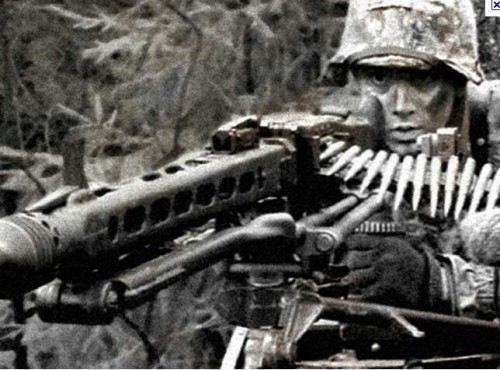
|
http://www.ww2lhawebpages.com/THEFIRSTDIVISION/HISTORY_SPALDINGINTERVIEW.html
………….
The American victory at Omaha
was achieved against tremendous odds. Omaha Beach will go down in
history as one of the most incredible acts of bravery and
determination in American military history.
Some people, however, call Omaha a
hollow victory when viewed against the heartbreaking loss
of so many young American lives.
Over the years since D-Day, the battle of Omaha has generated a
tremendous amount of criticism. The leaders’ tactics have been
called into question and the military value of sending men into such
clearly prepared defenses has also come under fire.
As remarkable as the victory was, no one can overlook just how close
the Americans came to one of the most depressing defeats in American
history. Was it worth it?
Let’s review the tactics first. It
is fairly
obvious to everyone that whatever could have possibly gone wrong at
Omaha did indeed go wrong.
Eisenhower was warned that the weather was bad and that the seas
were rough. His counterpart Rommel read the same weather reports
and believed no one would be foolish enough to invade in this
weather. Maybe Rommel was right.
-
The weather was so
bad that the assault teams lost the use of all their tanks till
late in the day after the fighting over.
-
The rough weather
created the most havoc with the landing vessels. Some of the
LSTs sunk due to the high waves.
-
Other LSTs ran
straight into the steel spiders based they were impossible to
control.
-
For that matter,
the rough waters forced practically every landing vessel to go
far off track. All day long, no one had a clue where they
were.
-
The biggest
disappointment of the day had to the complete failure of the
aerial bombing and naval shelling to weaken the German
defenses. Again the weather was largely to blame. Unable to
see through the cloud layers, the pilots weren’t about to take a
chance of dropping their bombs on their own men. As a result,
most of the bombs fell far behind the
German defenses.
The truth of the matter is that the American victory that day can be
chalked up to two things – amazing luck and amazing bravery. No one
incident illustrates this more clearly than the moment Sergeant
Streczyk risked his life to blast a hole in the barbed wire with a
hail of bullets.
No man epitomizes the combination of
luck and bravery of the day more than Sergeant Streczyk.
A person has to ask, “What happens if Streczyk
doesn’t blow a hole in the barbed wire? What if he ran out of luck
and got killed instead?”
Good question. The answer is pretty simple – a lot more Americans
would have died at Omaha Beach that day. Yes, the men from the
other four sectors would have eventually surrounded the bunkers and
taken out the defenses above Omaha, but not before hundreds more men
died needlessly on the kill zone beaches.
Streczyk’s cold-blooded heroism at the
barbed wire explains why his company commander later called him "the
greatest unsung hero of World War II".
Streczyk was also lucky. Considering
the number of bullets and mortar that barely missed hitting him, he
was truly a charmed man. His luck closely parallels all the other
lucky breaks the Americans got that day.
Someone will surely ask, “How can
anyone say the Americans were lucky when 2,500 men were
slaughtered?”
Well, for one thing, they were
slaughtered because someone sent them onto that beach without
protection. That’s not bad luck, that is highly questionable
military tactics.
Or someone will ask, “What about all
those tanks that sunk at the start of the battle?”
Again, that wasn’t bad luck, that was
incompetence. Curiously, those tanks operated fairly well at the
other four beaches. 27 of 28 tanks landed at Utah Beach.
Unfortunately at Omaha, the place where they were needed the most,
someone decided to launch the tanks much too far out at sea. The
men who designed them pleaded with the Americans to take them as
close to shore as possible before releasing them, but someone didn’t
listen.
In retrospect, the only real stroke of
bad luck all day was running into the German 352nd at
Omaha. Other than that misfortune, the Americans had luck on their
side all day long.
They were lucky that Rommel had left to
go to a birthday party. They were lucky that the Panzer division
wasn’t released until it was too late. And why not? It seems no
one had the nerve to awaken Herr Hitler from his sleep to get
permission to release the tanks. The Americans were lucky that
their LSTs were blown so badly off course at Utah Beach that most of
the men accidentally came ashore at a place where there were no guns
at all. The Americans were also lucky that the great long-distance
guns of Pointe du Hoc had not yet been installed. Like the movie
The Guns of Navarone, those massive guns would have
ripped the destroyers to shreds when they moved closer to shore.
Yes, the Americans were brave at Omaha
Beach. Incredibly brave.
Unfortunately, after reading all the
stories, it doesn’t seem out of the question that our military
leaders should be held responsible for the heavy casualties.
Someone decided we could just bludgeon the Germans into submission
at Omaha Beach. Consequently a lot of defenseless men died
needlessly. In retrospect, considering Omaha Beach was clearly the
strongest defensive position of the five beaches, a direct paratroop
assault from the rear would have been just as effective
Fortunately the Americans soldiers were
brave enough to overcome the questionable tactics of their
superiors. Leadership can make a difference. Look what Rommel
accomplished. Isn’t it a shame the Americans used Patton as a
decoy? Interestingly, the German 352nd was no match for relief
forces of General George Patton's Third Army during the Battle of
the Bulge.
It almost makes you wonder if the
Germans were right – Patton should have been leading the invasion at
D-Day.
The Big Red monument erected to the 1st Division, stands on top of a
bunker used to house a
searchlight, possibly 50 cm.
Like most of the Atlantic wall this strong point was not completed
by D-day.
WN62 and its sister strong point WN61, just to the east played an
devastating roll on D-day causing many of the American casualties on
this sector of the beach.
Because of the failure to get the swimming tanks ashore (Duplex
Drive) there was no
armour to support the Infantry for several hours. The 75 mm guns
could pick off the landing craft and cause devastation to the troops
trying to get a foothold on the beach.
Around lunchtime a British Frigate sailed along the beach and
managed to put 3 inch
shells into the two casemates. Several did not explode and in the
lower of the casemates you can still see the shells imbedded in the
internal walls of the bunker.
The guns were finally silenced by a Sherman tank supported by
Infantry.
Rommel believed that the invasion needed to be
stopped on the beaches, von Rundstedt, along with Heinz Guderian
disagreed. Hitler vacillated and placed them in the middle, far
enough to be useless to Rommel, not far enough for von Rundstedt. As
a result of this 21st Panzer was placed near Caen, in the area of
the British landings. The SS units that were supposed to support the
division could not be released as they were under Hitler's direct
command.
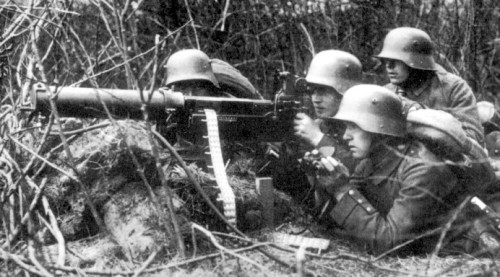
I was the first one out. The seventh man was the next one to get
across the beach without being hit. All the ones in-between were
hit. Two were killed; three were injured. That’s how lucky you had
to be.
Captain Richard Merrill, 2nd Ranger Battalion.
courage is not the absence of fear, but rather
the ability to act in spite of fear
Captain Edward Wozenski
Commander, Company E, 16th Infantry, 1st Division
In climbing the bluff later in the day, I met Sgt Streczyk coming
down to me on the situation. He stepped directly on a teller mine
righ in front of me nose. I asked what in the hell he was doing
since we both saw the mine clearly.
Streczyk replied, "Well, it didn't go off when i stepped on it going
up the bluff."
If Streczyk did not earn a Medal of Honor, no one ever did.
Thousands of men were on the beach being killed like flies. To even
lift your head over the shingle was to invite quick death. yet
Streczyk led a small group up the bluffs, clearning out enemy
pillboxes, released a flare indciating his breakthourgh, which and
others followed.
by S. L. A. Marshall
First Wave at Omaha Beach
UNLIKE what happens to other great battles, the passing of the years
and the retelling of the story have softened the horror of Omaha
Beach on D Day.
This fluke of history is doubly ironic since no other decisive
battle has ever been so thoroughly reported for the official record.
While the troops were still fighting in Normandy, what had happened
to each unit in the landing had become known through the eyewitness
testimony of all survivors. It was this research by the field
historians which first determined where each company had hit the
beach and by what route it had moved inland. Owing to the fact that
every unit save one had been mislanded, it took this work to show
the troops where they had fought.
How they fought and what they suffered were also determined in
detail during the field research. As published today, the map data
showing where the troops came ashore check exactly with the work
done in the field; but the accompanying narrative describing their
ordeal is a sanitized version of the original field notes.
This happened because the Army historians who wrote the first
official book about Omaha Beach, basing it on the field notes, did a
calculated job of sifting and weighting the material. So saying does
not imply that their judgment was wrong. Normandy was an American
victory; it was their duty to trace the twists and turns of fortune
by which success was won. But to follow that rule slights the story
of Omaha as an epic human tragedy which in the early hours bordered
on total disaster. On this two-division front landing, only six
rifle companies were relatively effective as units. They did better
than others mainly because they had the luck to touch down on a less
deadly section of the beach. Three times that number were shattered
or foundered before they could start to fight. Several contributed
not a man or bullet to the battle for the high ground. But their
ordeal has gone unmarked because its detail was largely ignored by
history in the first place. The worst-fated companies were
overlooked, the more wretched personal experiences were toned down,
and disproportionate attention was paid to the little element of
courageous success in a situation which was largely characterized by
tragic failure.
The official accounts which came later took their cue from this
secondary source instead of searching the original documents. Even
such an otherwise splendid and popular book on the great adventure
as Cornelius Ryan's The Longest Day misses the essence of the Omaha
story.
strongpoint WN64 was cleared around 1000 hours,
although a lone pillbox at the head of the draw remained in German
control until the evening
Perhaps Joe Dawson himself had the best word on the subject. The
former G Company captain wrote to popular historian Stephen Ambrose
fifty years after D-Day: "I feel, Dr. Ambrose, that all honor and
tribute should be given to Lt. Spalding and his small group of men
and to the men of G Company 16th Infantry, for they formed the
spearhead that through luck, courage, and proficiency opened the one
breach in the enemy's defenses that led to the winning of the battle
of Omaha Beach."
Comments on Spalding's Movements
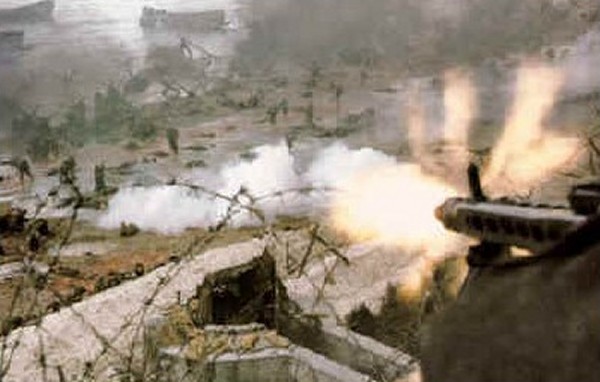
Widerstandsnestern 60
The German forces suffered relative
light casualties from the pre-invasion aerial and naval bombardment.
Though somewhat shell-shocked, they sprang to action quickly, and
even the volunteer units from Eastern Europe fought reasonably well.
As the result, most of the strongpoints were fiercely defended,
forcing the Allies to seize just about every single one by force. As
soon as Gerd von Rundstedt realized that the attack was a major
Allied invasion attempt, he contacted Adolf Hitler for permission to
release all tanks for a counter attack, but permission was slow in
the coming as Berlin still considered the possibility that the
invasion was merely a diversionary attack. Therefore, the only tanks
available were those of Feuchtinger's 21st Panzer Division located
south of Caen. By the time those tanks moved, it was already
mid-morning, and Allied fighters and fighter-bombers had already
established tight patrols in the air, making vehicular movement very
difficult for the Germans.
VON RUNDSTEDT EXPLAINS
--------------------------------------------------------------------------------
"Had I been able to move the armored divisions which I had behind
the coast, I am convinced that the invasion would not have
succeeded."
Lack of air power, and interference from higher levels, played major
roles in the defeat of the German Army after the Normandy invasion,
according to Field Marshal von Rundstedt. But the former German
commander-in-chief in the West has admitted that the Allied
commanders outsmarted him several times to make the situation even
worse.
Caught in the position of a boxer up against an opponent with both a
good left hook and a good right cross, Von Rundstedt guessed
incorrectly that the right cross—the invasion of the Cotentin
Peninsula—was merely a feint to the landing of the left hook—an
invasion of the Belgian or French coast farther north. By the time
he and his successors discovered that the right cross was really the
knockout blow, it was too late to save anything but remnants of the
German Army in France.
A great deal of the interference from higher levels developed later
during the Battle of Germany, Von Rundstedt declared, the worst
instance being the Ardennes counteroffensive of December 1944 and
January 1945.
"The Ardennes offensive bore my name quite wrongly," the former West
Front commander protested. "I had nothing to do with it. It was
ordered from above down to the smallest detail."
He thought, too, that interference from above had wrecked his
earlier plans for the defense of France against the invasion. In the
first place, he did not have enough troops to cover the areas in
which the invasion might come, and higher officers interfered with
the distribution of what he had. When it finally became necessary to
shift troops around, it was too late—by that time Allied planes had
such overwhelming air superiority that they blasted his
reinforcements to bits, or stopped their movement by cutting
communications facilities.
BASIC GERMAN WEAKNESSES
The situation immediately prior to the invasion of June 1944 was not
good, Von Rundstedt said. He and his former Chief of Staff, General
Blumentritt, recognized at least three basic weaknesses: their
inadequate number of troops had to cover enormous stretches of coast
line, some divisions as much as 35 to 40 miles; the Atlantic Wall
was "anything but a wall, just a bit of cheap bluff"; and there was
no counterattack reserve or so-called "Armee centrale," a strategic
army under central command to counterattack where the invasion came.
Von Rundstedt, like many other German generals, said he did not
control Germany's best troops. He complained that many of his best
units were sent to Italy, and he asserted vigorously that it was
"madness to continue the war in Italy that way."
After the collapse of Italy, "that frightful 'boot' of a country
should have been evacuated. Mussolini should have been left where he
was, and we should have held a decent front with a few divisions on
the Alpine frontier. They should not have taken away the best
divisions front me in the West in order to send them to Italy.
That's my private view."
Whether he could have gotten more troops for the West, Von Rundstedt
did not know. He did know that the High Command was hard pressed for
troops on all sides, but nothing was ever done about it.
"It was only decent to do something" after Mussolini was reinstated,
Von Rundstedt admitted, but he added, "of course it was absolutely a
matter of politics and nothing else. I assume, though I have no
positive knowledge, that the High Command was in favor of it."
"I thought that was nonsense, too," Von Rundstedt said of the
occupation of Norway. "What was the point of occupying it?"
He termed the Norwegian operation "purely a naval affair" in which
he had no interest. In fact, his major interest all along was to
accumulate the proper armored divisions, mobile forces which could
be quickly sent where they were needed.
HIGH COMMAND INTERFERED
"Had I been able to move the armored divisions which I had behind
the coast, I am convinced that the invasion would not have
succeeded." Von Rundstedt made this emphatic statement as he told of
continued interference from higher levels with the disposition of
his inadequate forces. "If I had been able to move the troops, then
my air force would also have been in a position to attack hostile
ships."
If he had had his way, Von Rundstedt indicated that the Allies would
first of all have sustained prohibitive losses during landing
operations. In addition, they would not have been able, "with
relative impunity," to bring up battleships close to the coast to
act as floating gun batteries.
"That is all a question of air force, air force, and again air
force," he commented.
The Normandy invasion would have been "like Dieppe on a big
scale"—Von Rundstedt believes—if he had been able to move his
armored divisions as he desired. He summarized the situation with
the statement:
"We would certainly have been better off if a good many things had
been different as regards the distribution of forces."
Von Rundstedt claims that the Atlantic Wall was a "mere bluff," but
admitted that the French coast was more heavily fortified from the
Scheldt to the Seine. Pictured are German fortifications of the more
imposing type.
ATLANTIC WALL MYTH EXPLODED
"The enemy probably knew more about it than we did ourselves," Von
Rundstedt said in referring to the so-called Atlantic Wall as a
"mere bluff." He confessed that such a wall did exist from the
Scheldt to the Seine, "but further than that—one has only to look at
it for one's self in Normandy to see what rubbish it was."
According to Von Rundstedt, the wall consisted of a few pillboxes in
holes in the sand so far apart that "you needed field glasses to see
the next one." The only good thing was the fortresses, such as
Cherbourg and Brest, but they were all fortified only toward the
sea. He described the wall as "a dreary situation" south of the
Gironde toward the Spanish border because "there was really nothing
at all there."
All the ballyhoo about the Atlantic Wall was simply propaganda, Von
Rundstedt said, but he admitted that people believed it—"at least we
believed it." He thinks, however, that it was no mystery to the
Allies because their air photography probably revealed the bluff.
Although a lot of material went into the defenses, Von Rundstedt
complained that the Navy got most of the concrete. He pictured the
German Navy as building higher and thicker roofs on their U-boat
shelters every time the Allies dropped a heavier bomb.
"It doesn't suffice to build a few pillboxes," Von Rundstedt pointed
out. "One needs defense in depth. Moreover, the requisite forces
were lacking—we couldn't have manned them, even if fortifications
had been there."
ARTILLERY WEAKNESSES
The former German commander in the West really warmed up on the
subject of coastal batteries and artillery. Admitting that he was
not an artilleryman, Von Rundstedt nevertheless severely criticized
the mounting of the coastal guns. They were mounted as on ships, and
could fire only out to sea. They were of no use to land forces
because they could not fire in all directions. To make things worse,
the coastal batteries included many captured guns, thus hampering
the supply situation.
As if things were not bad enough, Von Rundstedt complained, the last
divisions he got were very weak in artillery, some of them having
only three light batteries. A good division on land should have nine
light batteries and at least three heavy batteries, in his view.
CAUGHT WITH PANZERS DOWN
Von Rundstedt confessed that the Allies caught him flatfooted with
their thrust out of the Cotentin Peninsula. If he had been in the
position of his enemy, intent on taking Paris and the interior of
France, Von Rundstedt explained, he would have landed to the left
and right of the Seine and taken the shortest route.
The Atlantic Wall, said Von Rundstedt, consisted of a few pillboxes
in the sand (above) so far apart that "you needed field glasses to
see the next one." The only good thing was the fortresses, such as
Cherbourg and Brest (below), he explained, but they were all
fortified only toward the sea.
He admitted that he was puzzled because he believed a landing on the
Cotentin was aimed at securing a harbor. At the same time, he could
see no point in getting a harbor there because the route to the
interior of France was three times as long.
Believing the most powerful thrust would come through Belgium toward
the Ruhr, Von Rundstedt considered the area northeast from the Seine
to be the most dangerous. For that reason, the division sectors on
that coast were shorter, and the fortifications there were
constructed as strongly as possible.
Adding to Von Rundstedt's belief that the landing would come further
north was the fact that the Navy believed a landing could be made on
the Cotentin only at high tide. Even then the rocks and reefs below
the water would wreck the ships, thus making a landing extremely
hazardous. Here, too, the Allies fooled him by landing at low tide
and using the rocks as cover against the fire from land.
"We probably didn't know about the floating harbors." he commented
in explaining that he had not considered the Cotentin a likely
landing area. "I, at least, didn't. Whether the Navy knew of them I
don't know."
SECOND INVASION EXPECTED
Von Rundstedt said there were definite grounds for anticipating
another invasion further north, primarily front tactical and
strategic considerations. Projecting himself into the mind of the
Allied high command, he reasoned: "I will land here, wait until the
Germans have gathered all their forces to meet me, and then land at
the other place."
An additional motive for a second landing was the fact that the
launching ramps for the V-bombs were in the Belgian area—if the
effect of these bombs was as unpleasant as German propagandists
declared.
The German Navy believed an Allied landing would be made only at
high tide, and would be extremely hazardous because of rocks and
obstacles. Instead, the Allies landed at low tide and used the
obstacles for cover.
"I can't believe it was." Von Rundstedt commented, "because so far
I've seen no results of V-weapons here (in England). But it would
have counted for something, perhaps, if they were as unpleasant for
the English as they afterward were for us in the Eifel, when they
all went back into our own lines.
"The V-weapons as such had nothing to do with us in the Army," he
said. "The actual protection of them was undertaken by the Flak." He
argued that he was afraid of an Allied thrust north from the Seine
more because of the strategic importance of an attack toward the
Ruhr and Lower Rhine than because of the V-bombs.
"A landing which for a long time we considered very likely before
the invasion actually began was one to get rid of the U-boat
bases—namely, Brest, St. Nazaire, and Lorient—from the rear," Von
Rundstedt declared. "Then when the U-boat business collapsed so
completely, we said that was no longer of interest and wouldn't come
off. Attention was then concentrated more and more on the northern
part."
GERMAN ARMORED SITUATION
Although Von Rundstedt could not remember his exact tank strength in
France at the beginning of June 1944, he thinks he had approximately
six or seven Panzer divisions, but they were spread out. Two were
immediately available when the invasion came, and two others were
able to come up on the first day. Another one came from Belgium, and
then one came from southern France. He complained that one division
never did make it from southern France because it had "some
difficulties" with the Maquis.
"The defensive role played by the armored divisions near Caen during
July and August was a great mistake." Von Rundstedt confessed, "but
it was done on the orders of higher authority. We wanted to relieve
the armored divisions by infantry, but it was impossible in the
bulge in front of Caen where they were also under fire from ships'
guns. You can't relieve any troops then."
Von Rundstedt's plan, which was turned down, was to withdraw the
armored forces behind the Orne, form up the relieving infantry
there, and then take away the tanks from in front and use them as
mobile units to attack U.S. forces on the flanks. He was backed up
by the senior tank commander, General Beyr von Schweppenburg, but to
no avail. The armored divisions were left where they were "on the
Führer's own orders."
"Whether similar orders were likewise responsible for the Avranches
counterattack, I don't know," Von Rundstedt commented, "since I left
on 1 July."
He said he had wanted to make a counterattack while German forces
were still north of St. Lo. His plan was to thrust between the
British and American landing troops, attacking the Americans and
merely screening off the British, because the terrain was more
favorable and the battle prospects were better.
AIR POWER AT WORK
Systematic preparations by the Allied air forces caused the general
collapse of the German defense, Von Rundstedt said. He cited three
important factors.
First, there was the smashing of the main lines of communication,
particularly the railway junctions. Although Von Rundstedt had
planned the defense so that reserves could be moved to the
threatened areas, Allied planes knocked out railway lines and made
the shifting of troops impossible.
The second factor was the attack on roads and on marching columns,
individual vehicles, etc., so that it was impossible to move by day.
This made it extremely difficult to bring up reserves, and it also
created a supply problem because fuel and ammunition could not be
brought up.
Carpet bombing constituted the third factor. In certain respects,
Von Rundstedt said, it constituted an intensified artillery barrage
and knocked out troops in pillboxes or dug in ahead of the front
line. It also smashed reserves in the rear.
Although the GAF "did what it could," Von Rundstedt pointed out that
he had practically no air reconnaissance. German planes which did
take to the air were outnumbered 10 to 1, and any long-range
reconnaissance was "absolutely nonexistent."
"Rommel's asparagus" (beach obstacles) was "well meant," according
to Von Rundstedt, but it was not much of a success because in some
places the sea simply turned the obstacles around and sanded them up
or rolled them away.
In reinforcing German troops fighting in the Cotentin, men were
immediately withdrawn from the southern front. Troops were held on
the northern front, however, because the Germans were afraid of a
landing on the Belgian or French coast. As explained by Von
Rundstedt, the Germans believed that "Phase I is here, but Phase II
will come there."
When it became apparent later on that the Normandy invasion was the
real thing, the destruction of the Seine bridges "made itself felt
very unpleasantly." The reserve troops had to be detoured around or
brought over in ferry boats.
THE ARDENNES OFFENSIVE
Turning to the Ardennes offensive, Von Rundstedt said that every
protest on our part, including those from the late Field Marshal
Model, was turned down."
"Rommel's asparagus" was "well meant" said Von Rundstedt, but it was
not much of a success because in some places the sea simply turned
the obstacles around and sanded them up or rolled them away.
When it became apparent later on that the Normandy invasion was the
real thing, said Von Rundstedt, the destruction of the Seine bridges
"made itself felt very unpleasantly." The reserve troops had to be
detoured around or brought over in ferry boats.
According to Von Rundstedt, when it finally became necessary to
shift troops around, it was too late—by that time Allied planes had
such overwhelming air superiority that they blasted his
reinforcements to bits.
If he had directed the attack, Von Rundstedt said, he would have
confined himself to a smaller objective. His plan would have
embraced an attack on the Aachen pocket from two sides in an attempt
to destroy it.
"For a far-reaching operation such as the Ardennes offensive, aimed
first at the Maas and possibly still further, the forces were much,
much, much too weak. The possibility of driving inland with armored
divisions, with no GAF, was purely visionary. Reinforcements and
supplies, with their railheads back on the Rhine, took longer and
longer to move, and it was impossible to get them up. That offensive
was bound to fail. There was no other possibility."
Pointing to the German offensive in 1940 from Trier toward
Luxembourg and Calais, Von Rundstedt explained that a vast number of
troops were available simply to cover the flanks and protect the
spearhead. The forces in the Ardennes offensive were far too weak
for the exercise of a comparable function, he explained, using as
examples the actions at Bastogne and near Stavelot-Malmedy.
"If I do anything like that, I must have large, very large forces."
Von Rundstedt concluded, "but those suggestions were not heeded and
things turned out as I'd expected. The root of the whole trouble was
air power, air power!"
http://www.scribd.com/doc/38609039/Fortress-D-Day-Fortifications-in-Normandy
useful info on spalding movements.
The first wave of landers consisted of 1,450
men in eight infantry companies. They reached the beach at 0631
hours. As soon as the ramps dropped, the landing craft were under
intense machine gun and rifle fire. This gave light to the second
mistake the Allies committed for the Omaha Beach operations.
American did not think highly of British General Hobart's "funnies",
which were modified tanks used for some of the other beaches on this
day to provide additional cover, which were now realized as badly
needed. The American did deploy tanks, in the form of duplex-drive
tanks (DD tanks), but most of them were released too far out to sea
that most of them sank in the choppy waters; only 5 out of the 32 DD
tanks made it to land. The American soldiers on the beach could only
find refuge behind German beach obstructions such as concrete cones
and welded steel rails; they were promised craters made by aerial
bombs immediately before the landing, but the bomber crews, fearful
that they would hit friendly ships, delayed the bomb release by 30
seconds, so their bombs fell far inland (hitting American
paratroopers in few instances), leaving the beach crater-less and
coverless.
As one gazes at photographs of Omaha today (like the one of the
beach in front of Vierville above), one invariably looks at the
wide, flat, and now serene and unobstructed beach, extending as far
as the eyes can see, and perhaps cannot feel but awed by the mental
vision of the satanic maelstrom those soldiers had traversed to
reach the foot of the now quiet bluffs. The thought that men could
perform such an incredible feat is mind boggling and profoundly
humbling.
They came from the sea, in little steel boats through swarms of
drowning men and floating dead bodies, through a nightmarish storm
of destructive forces seeking their annihilation. No words can even
begin to honor their grim determination.
|
The Americans Strike Back
|
About two hours after the disastrous beach
landings, many soldiers decided the time had come to quit feeling
sorry for themselves. Part of their decision came from
leadership, part from within. One by one, various soldiers
chose to leave the protective cover of the seawall and head up the
hill. They knew they were facing terrible danger.
No one's company
still existed. Most of their officers were dead or
incapacitated. Out of necessity, the man banded together with
strangers and formed new teams. The survivors
of the morning began improvised penetrations
designed to take out the German guns above.
So far, the German defense of Omaha Beach had been ruthlessly
effective, but the men who began to scale the bluffs between the
most heavily defended points were going to do
something about that.
It wasn’t easy though. There were all sorts of problems climbing
the bluffs. The ground was heavily mined. There was barbed wire
everywhere. Plus hidden snipers posed a serious threat
to anyone trying to climb.
On the other hand, there were finally some advantages. The machine
gun nests above did not have a good angle or visibility to shoot
down on the men. As long as the men stayed in small groups, they
were hard to detect from the ridge above. Second, in some places
there was shrubbery on the hillside that could be used to offer
camouflage. This allowed the men the time to move cautiously while
looking for the mines. In addition, there were grass fires
everywhere that gave much-needed smoke concealment.
Another major factor
in the coming turnaround
must be credited to the Navy. At 0830
hours, a Navy beachmaster on Omaha signaled
the fleet that no more landing craft were to come ashore. There
were so many ruined craft at the water’s edge that any further
incoming vessels would be unable to get close enough to the beach to
unload any men. Furthermore, there appeared to be no safe landing
points from gunfire. Why
put more men on the deadly beach until it was safe?
General Omar Bradley
was commander of the U.S. First Army. He was watching the battle
from a battleship 11 miles
off shore. The information that reached
him made him grimace. The day had been a
complete disaster. Now he had to make a decision.
The assault by U.S.
troops over on Utah had landed against little enemy opposition. He
quickly ordered all remaining soldiers bound for Omaha to be sent to
Utah beach instead. But
what about the troops at Omaha?
They could not be evacuated. There would
be no reinforcements. Unless there
was a break in the deadlock, all of the troops already on
Omaha would eventually be killed or taken prisoner.
General Bradley had an idea.
He called on the big guns of the navy.
Seeing the infantry being subjected
to continual pounding, Bradley ordered the Navy to bring their
firepower as close as possible to shore for point blank shots
against enemy targets. To do so would risk making the ships
vulnerable to the powerful German cannons on shore. That was a risk
he was willing to take.
Immediately a flotilla
of destroyers moved close to shore and began hammering German
positions at close range. Soon German pillboxes and trenches were
being swept away by the accuracy of the Navy’s guns. That made a
huge difference. Many of the pinned-down American infantrymen were
pinned down no longer. The
destroyers had made a big difference. The
tide of the battle began to turn.
|
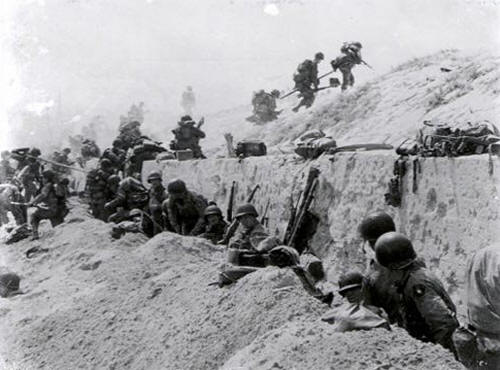
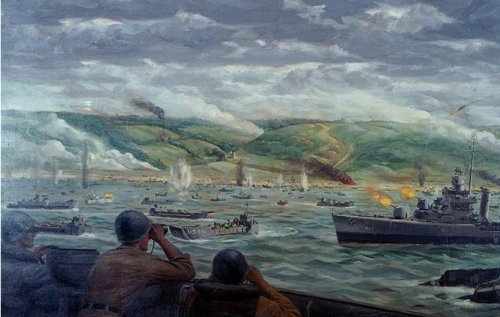
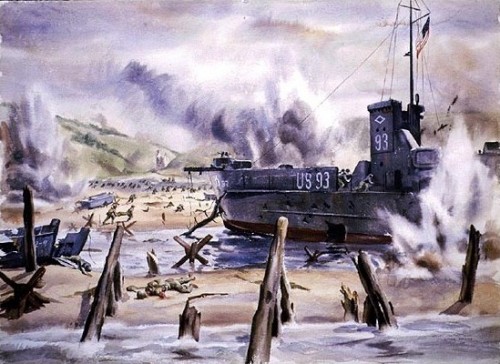 |
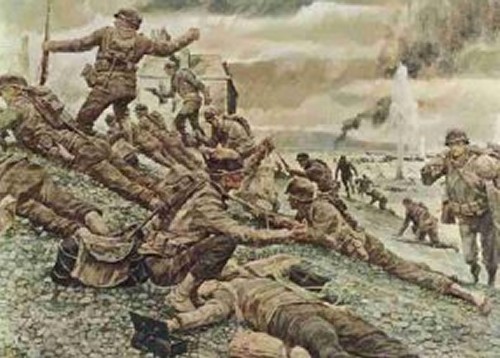
 |
The following assault on the
bluffs above Normandy’s Omaha Beach sector
led to some of the most amazing stories of heroism in American
history. Lieutenant William B. Williams was one
of the remarkable men responsible for the comeback effort.
Williams led his men off the beach to
the protection of the sea wall. Pinned down by a machine gun and
mortar fire, Williams realized that he and his men had to move or
else be gunned down. The lieutenant ordered his ten men to give him
cover fire while he charged the machine gun nest himself with live
grenades in each hand.
Before barely advancing a few steps,
Williams was hit. As he fell,
Williams tossed the grenades but they fell
too far from the nest to do any damage.
While Williams was on the ground, he
suffered yet another hit. Determined not
to fail, Williams was able to crawl forward a little closer, pull
the pin out of another grenade and throw it. This time he didn’t
miss. The grenade fell into the machine gun pit, killing the crew
and silencing the gun.
Williams had just managed to stagger to
his feet when suddenly new mortar fire fell among the men located
about twenty yards away. Seeing them pinned down, Williams crawled
to a flanking position to throw his grenade. However the enemy
spotted Williams and they attacked him with grenades of their own.
Williams
was wounded by shrapnel and began to bleed profusely. In great
pain, these new wounds were not enough to keep him from inching
close enough to wipe out the mortar station with two more grenades.
Lieutenant Williams was hurt badly. He
knew he couldn’t go on. Williams called his men forward and
bequeathed his map and compass to his sergeant, admitting that he
couldn't move. He then ordered Sergeant Frank Price to take the
men forward without him. Price stared in horror at Williams'
multitude of wounds and protested, but Williams shook him off.
Williams said, "No, don’t stay with
me. You’ve got to get moving. The men on the beach are depending
on you. I’ll be okay."
Williams then had the men move him into
one of the craters created by the bombs earlier in the day. Finding
a convenient hole, Williams stayed there undiscovered all day.
Fortunately one of his men told a medic promise to look for him.
Miraculously, Williams was still alive
when they found him still in his hole.
He had been wounded so badly he was unable to
move. For the past 14 hours, Williams had suffer terrible
pain. Williams finally received medical attention just
before midnight.
For his heroism, William Williams was
awarded the Distinguished Service Cross.
|
|
There were many heroes at the
D-Day. One of the
most famous stories of the day belonged to
Sergeant Frank Strojny.
Landing early in the day, Strojny's assault boat went in as far as
possible. Like all the other LST landings, half the men were
immediately killed or wounded upon disembarking.
Strojney was the first one out;
miraculously nothing hit him. The next five men were dropped
on the spot. Two were killed; three were injured.
The seventh man managed to make it out
unharmed. That's how tough it was.
Strojny was one of
the few fortunate to still be living. He crawled ashore through the
shallow water and was pinned down on the beach by the same mortar
and machine-gun fire which had wiped out hundreds of officers and
men. Seeing men die around him right and left, Strojney decided to
stay in the water and play dead. With his face turned up to
breathe, he slowly inched forward on his back.
Strojny made sure to advance at the same rate as the tide
so that his body always stayed under water.
Strojny eventually reached the side of a dead
comrade and turned over on his belly to look
around. Strojney didn’t see any of his men.
But what he did see disgusted him. Wherever
he looked, he saw men who were dead and men who were in so much pain
they wanted to be dead.
Strojny noticed a
group of men huddled at the sea wall about third yards away.
Strojny wondered to himself how those men had made it that far.
Should he make a run for it?
Just then another
bullet whizzed by him.
Strojny had gotten
this far by being patient. There were just too many people
getting shot right now. He had no choice but to
continue to play dead. He hoped
anyone looking down from above would ignore him.
Strojny did make one change. Now that he was out of the water,
he preferred to keep his nose in the sand. If death was headed
his way, he didn't want to see it coming.
About ten minutes
passed before
Strojny sensed his nemesis somewhere above had
finally turned his gun somewhere else. When he felt no
bullets for a while, Strojny began to
crawl again face down in the sand.
Strojny was certain it was just a matter of time before a stray
bullet found him, so it took all his discipline not to panic and
suddenly make a last ditch run to safety.
Strojny was about ten
yards when one of the men at the sea wall told him to make a run for
it. Strojny was startled by the voice. Strojney was
about to get up and sprint when he remembered he
had no equipment;
Strojny had thrown his equipment away in his haste to make it to
shore.
At a point when the bullets seemed to be going elsewhere,
Strojny stood up, grabbed a
dead man's Browning automatic rifle off the beach and raced
the final ten yards to the sea wall and safety.
He collapsed from exhaustion.
Completely separated from his outfit – most of them had been killed
or wounded in the landing – Strojny decided to
tag along with the outfit
of the man who had told him to get up and run. Using
wire cutters, they
snipped a hole through the heavy barbed wire. This did not
go unnoticed from above. Suddenly men dropped on all sides as
a German mortar team
dropped a shell on them from the
hillside. The shell didn't miss by much.
Shells proceeded to
rain down upon them. The men were completely pinned down.
One of the men had a radio. He called out some coordinates to
a command post.
The
men waited. A warning came back over the radio... get down and
stay down... a destroyer had been
signaled to shell the hillside.
"It
was amazing. That destroyer rode almost up on the beach
to zero in on the hillside," said Strojny. "That Captain had plenty
of guts. After the bombardment, one of the men
rose cautiously to see if someone would
shoot at him. He immediately ducked back down. When
nothing happened, we got braver and went
looking in the direction of the mortar fire.
At this point, due to his rank, Strojny
assumed command of the climb. He led
his men up the bluffs
until they reached a marshy area. One of the men, Private
First Class Frank Jefferson, whispered this could be a mine
field. That comment froze everyone. No one
dared move. All the men looked for another way.
Unfortunately, there wasn't an easy way around this mud patch.
After several minutes of paralysis, Jefferson
volunteered to test the mud patch. He seemed to have some
experience with mines. Jefferson got down on his belly and
began to inch his way through the mud. Jefferson pulled out
his hunting knife and began to probe carefully for mines. What
else could he do? Almost immediately his knife struck
the side of something metallic. Sure enough, this area was
mined.
Someone handed
Jefferson
a stick. He stuck it in the mud to mark the location of the
mine. Then he poked in every other possible direction until he
was sure there was no other hidden mine nearby.
Jefferson
began to crawl in a new direction. Meanwhile the other men
flattened themselves out on the ground to avoid detection and for
safety in case a mine blew. The tension was unbearable.
They were almost certain
Jefferson
was going to blow himself up and take them all with him.
Progress was slow due to the danger.
Finally Jefferson found a safe path through. He had
found four mines and marked each of them. As long as
the men were careful where they stepped.
One at a time, each man crossed the ditch while the others held
their breath. When they had all reached safety, Strojny
told the men to stay back. He picked up a rock and threw it at
one of the sticks. Nothing happened. So he threw another
rock, a big one, and hit the deck. This time the mine
exploded. For the next five minutes, the men made a game out
of blowing up the mines. When they finished, Strojny crossed
two large sticks in the mud to indicate danger for the next man up
this path.
The men were very worried about sniper fire and
more mines. Crawling up through
the hill single file, they took turns with the unnerving job
of leading. Every twenty yards, they rotated
point man. If one man made it through an area unharmed,
the others would follow directly
in his path. It took forty-five minutes
to make the climb, but finally they drew
closer to some bunkers.
But they couldn't see any mortar gun.
Strojny recalled, "Nearby the bunker, one of the
men spotted a tunnel. We had not
seen any sign of German activity. They had to be somewhere.
After waiting for any kind of sound, we decided to go in. We
were scared out of our minds. It was so damn dark in there if
anything moved, I think every one of us would have started shooting.
After a walk of ten yards we saw some daylight and followed it. We
discovered a German mortar crew on the
other side. We took them out for shooting our buddies.
Then we went back inside and followed a another
tunnel going somewhere else. It was rugged going."
Strojny described the hillside as honeycombed with connecting
tunnels. These tunnels were well
made. Every one of them was
reinforced with steel. As they explored,
they found invisible mortars that
were dug into the hill. Using stealth, they
eliminated two more mortar positions.
Strojny recalled marveling at the German
ingenuity. No one could see the mortar nest because
only the end of the firing tube
protruded. No one could see a man go to
the mortar station because he reached it through an underground
tunnel. Furthermore, beside each mortar
station was a photograph of the section of
the beach that each mortar was
expected to cover. The
Germans had measured exactly where every shell would land.
Strojny let out a low whistle. They were
very good at killing the enemy.
"Those Jerry's were damn smart," said Strojny. "They
had a bomb or bullet for every spot on the beach. To
this day, I still don't know how any of us got off that beach and
lived to tell about it."
Once his men discovered it was possible to move
undetected through the tunnels,
their fear gave way to an overpowering anger.
One tunnel reached the top.
Up top, the men spotted two pillboxes
buried in the side of the bluff behind the beach. The men watched
in horror as the 88 mm guns poured deadly fire into the oncoming
assault boats below. Something had to be done – but quick – to
remedy the slaughterhouse below.
At that moment, the
Germans spotted them and began shooting with small arms.
Several men were hit on the spot.
Sizing up the
situation, Strojny picked up a Bazooka from a wounded soldier
nearby. Strojny knew the Bazooka had been
pierced by shrapnel. In that condition it
should not have been fired.
Strojney decided to take a chance. With
complete disregard for his safety, Strojny tucked the Bazooka under
his arm, gathered some rockets and hunched across a series of
craters formed by the earlier battleship bombardment to
a vantage point closer to the pillboxes.
He had one more obstacle – a mine field strewn with American
corpses. Strojny was surprised other men had
made it this far.
Ignoring the obvious danger, Strojny made a practical albeit
gruesome decision. He decided the safest and quickest route across
the deadly mine field was to use the corpses as stepping stones. To
his grim satisfaction, this strategy worked. This was certainly not
the first time the dead had continued to contribute
today nor would it be the last.
Now in position some 250 yards from the first pillbox, Strojny let
fly with several rockets which ripped the big concrete emplacement
wide open, but did not knock it out.
Alarmed, the Germans concentrated heavy machine-gun fire on
Strojny's position. Only a miracle saved
Strojney from being cut to
ribbons. One bullet went through the front of his helmet, circled
his head and tore out through the side near his left ear.
Shocked to still be alive, Strojny retraced his way back across the
bodies in the mine field to get more rockets for the bazooka,
then crossed the mine field for a second
try. Once he was in position,
Strojny finished off the first pillbox. Then he used the cover of
the first burning pillbox to get into position to blast the second
pillbox into flames as well.
Strojny was screaming at the top of his lungs the entire time as he
fired. His men were wide-eyed at his fury. After taking out the
second pillbox, Strojny put down the bazooka and took a long deep
breath. When he turned to the men, he saw their looks of
disbelief. Strojny grinned sheepishly, “I
guess I just got a little mad”.
For his amazing accomplishments, Raymond Strojny was awarded the
Distinguished Service Cross by Eisenhower.
|
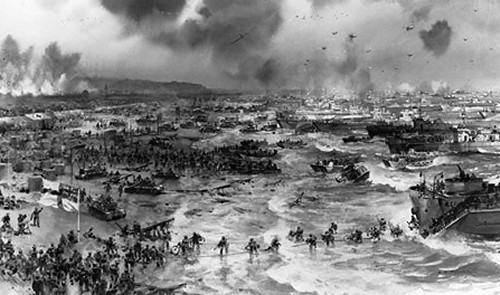
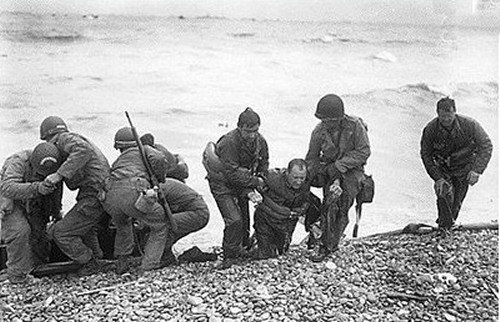
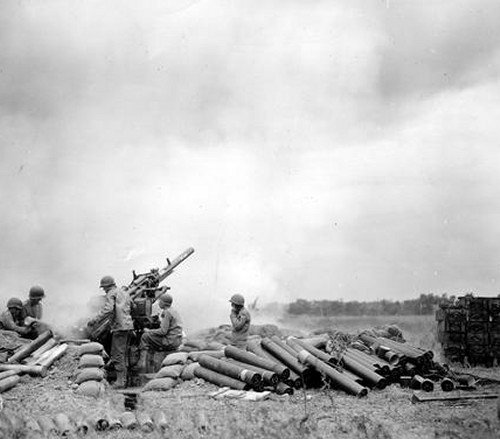

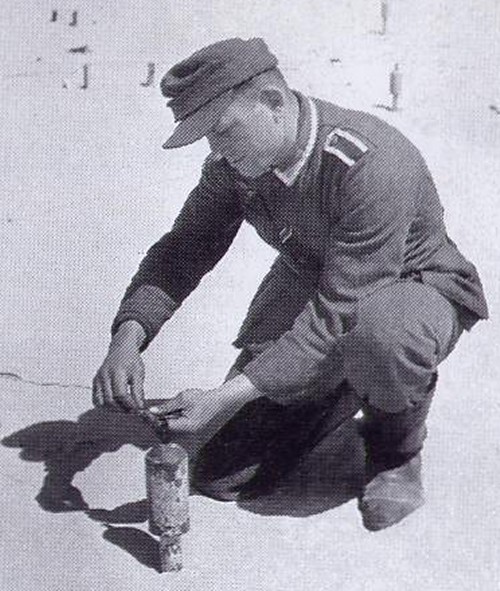
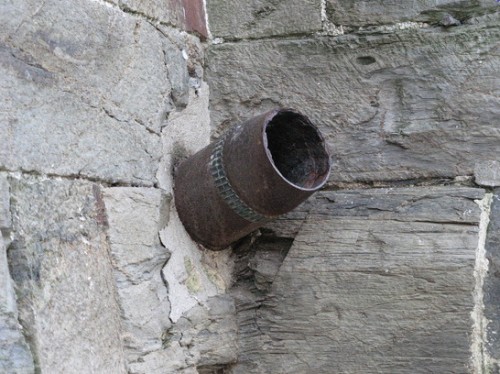
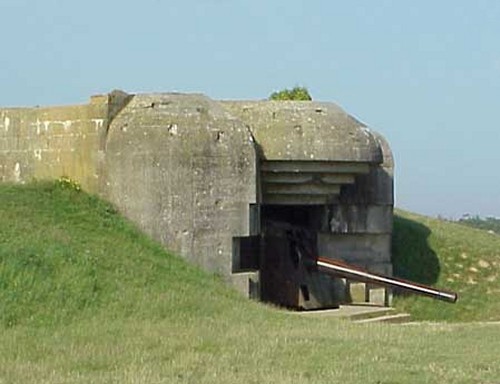
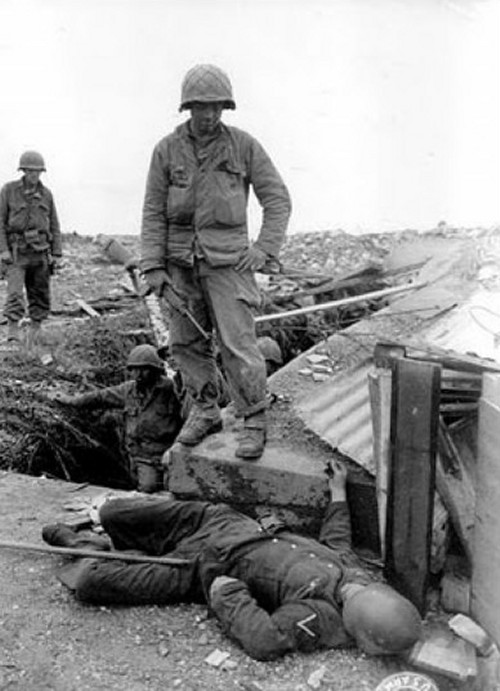 |
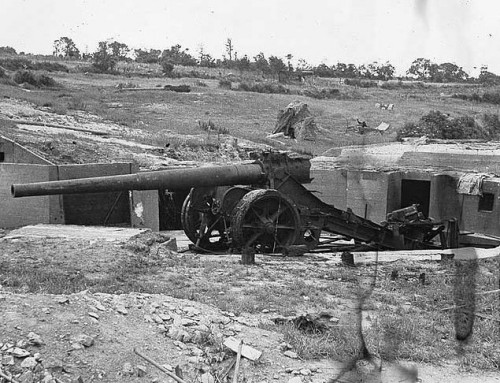 |
| creation of navy seals
Early in the war Allied planners realized the value
of scouts for reconnoitering enemy-held beaches. From this need the
Scouts and Raiders were born. Originally a joint Navy-Army unit, by 1944
the outfit was all Navy and all volunteer. Scouts and Raiders were
trained in long-distance swimming, small-boat handling, and the use of
weapons and explosives. They used rubber boats and a type of kayak-like
craft called a Folboat to sneak onto the shore without being seen.
In the weeks just prior to D-Day, Scouts and Raiders visited many
Normandy beaches, checking on such things as the type of sand—to see if
it would hold up a tank—or the placement of steel obstacles and teller
mines on wooden poles. They also verified water depths and the speed of
currents, then slipped back to sea, sometimes swimming miles to their
moored Folboats before paddling quietly and swiftly to waiting
motorboats for return to their base in England.
The Scouts and Raiders trained closely with other special teams such as
the naval combat demolition units (NCDUs), whose specialty was
demolition of beach obstacles: welded-steel hedgehogs, Belgian gates,
and other impediments to landing craft. The Navy recruited civilian
experts from coal mines and quarries to train the NDCU teams in handling
explosives.
As landing craft approached Omaha and Utah Beaches on June 6, 1944, they
were guided by Scouts and Raiders in several LCC—Landing Craft, Control.
One of the boat captains off Omaha Beach was Lt. Phil Bucklew, who saw
that sea conditions were too dangerous for launching amphibious duplex
drive (DD) tanks from landing craft several miles at sea. Unfortunately,
his radio report was ignored. Most of the DD tanks that were launched
toward Omaha Beach sank, some taking crewmen to the floor of the shallow
but deadly Bay of the Seine.
Other Scouts and Raiders teams were close to the beaches in LCS—Landing
Craft, Support—armed with twin .50-caliber machine guns, .30-caliber
machine guns, and rockets mounted in racks. Their job was to give
covering fire for landing craft as they approached the beaches.
In the water near the tide line on Omaha Beach, NCDUs worked with Army
teams from the 146th and 299th Engineer Combat Battalions, placing
charges against steel obstacles and blasting eight clearings through to
the beach. They had trained together before the invasion and were
combined for this operation to form part of the Special Engineer Task
Force, arriving on the beach five minutes after the first landing craft
came to shore. The NCDUs accomplished their task at a heavy cost to
themselves and were sometimes hampered by soldiers who tried to use the
obstacles as shelter while under heavy fire from German machine guns.
The NCDUs on Omaha Beach lost 31 men and suffered 60 wounded out of a
total of 180 men. They later received a presidential unit citation.
On Utah Beach, where the firefight was much less intense than on Omaha
Beach, the NCDUs lost only 6 men, and 11 were wounded. There, Navy teams
worked with Army demolition men from the 237th and 299th Engineer Combat
Battalions and cleared the beach of all steel and concrete obstacles—by
day's end they could claim 1,600 yards (1,463 meters) of cleared beach
available for safe landings. It was an invaluable accomplishment,
allowing the Navy to unload 20,000 troops and 1,700 vehicles onto Utah
Beach by the end of the day.
The Navy's use of Scouts and Raiders, NCDUs, and other special
operations groups including underwater demolition teams (UDTs) in World
War II eventually led to the creation of a dedicated unit that handles
many secret tasks that involve the sea and land. Called SEALs (for Sea,
Air, Land), they are one of the elite forces in the United States
military today. As their command historian, Don Crawford, says, they are
"busier than ever answering '911 calls' from around the globe."
|
Tour boats ferry people out to the USS Arizona Memorial in Hawaii
every thirty minutes. We just missed a ferry and had to wait thirty
minutes. I went into a small gift shop to kill time. In the gift
shop, I purchased a small book entitled, "Reflections on Pearl
Harbor" by Admiral Chester Nimitz.
Sunday, December 7th, 1941--Admiral Chester Nimitz was attending a
concert in Washington D.C. He was paged and told there was a phone
call for him. When he answered the phone, it was President Franklin
Delano Roosevelt on the phone. He told Admiral Nimitz that he
(Nimitz) would now be the Commander of the Pacific Fleet.
Admiral Nimitz flew to Hawaii to assume command of the Pacific
Fleet. He landed at Pearl Harbor on Christmas Eve, 1941. There was
such a spirit of despair, dejection and defeat--you would have
thought the Japanese had already won the war. On Christmas Day,
1941, Adm. Nimitz was given a boat tour of the destruction wrought
on Pearl Harbor by the Japanese. Big sunken battleships and navy
vessels cluttered the waters every where you looked.
As the tour boat returned to dock, the young helmsman of the boat
asked, "Well Admiral, what do you think after seeing all this
destruction?" Admiral Nimitz's reply shocked everyone within the
sound of his voice. Admiral Nimitz said, "The Japanese made three of
the biggest mistakes an attack force could ever make or God was
taking care of America . Which do you think it was?" Shocked and
surprised, the young helmsman asked, "What do mean by saying the
Japanese made the three biggest mistakes an attack force ever made?"
Nimitz explained. Mistake number one: the Japanese attacked on
Sunday morning. Nine out of every ten crewmen of those ships were
ashore on leave. If those same ships had been lured to sea and been
sunk--we would have lost 38,000 men instead of 3,800.
Mistake number two: when the Japanese saw all those battleships
lined in a row, they got so carried away sinking those battleships,
they never once bombed our dry docks opposite those ships. If they
had destroyed our dry docks, we would have had to tow everyone of
those ships to America to be repaired. As it is now, the ships are
in shallow water and can be raised. One tug can pull them over to
the dry docks, and we can have them repaired and at sea by the time
we could have towed them to America . And I already have crews
ashore anxious to man those ships.
Mistake number three: every drop of fuel in the Pacific theater of
war is in top of the ground storage tanks five miles away over that
hill. One attack plane could have strafed those tanks and destroyed
our fuel supply. That's why I say the Japanese made three of the
biggest mistakes an attack force could make or God was taking care
of America .
I've never forgotten what I read in that little book. It is still an
inspiration as I reflect upon it. In jest, I might suggest that
because Admiral Nimitz was a Texan, born and raised in Fredricksburg
, Texas --he was a born optimist. But anyway you look at it--Admiral
Nimitz was able to see a silver lining in a situation and
circumstance where everyone else saw only despair and defeatism.
President Roosevelt had chosen the right man for the right job. We
desperately needed a leader that could see silver linings in the
midst of the clouds of dejection, despair and defeat.
|
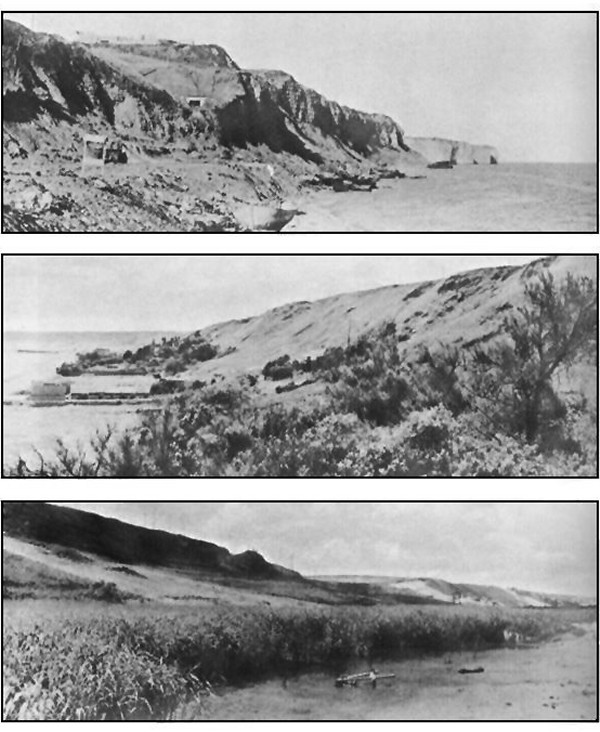
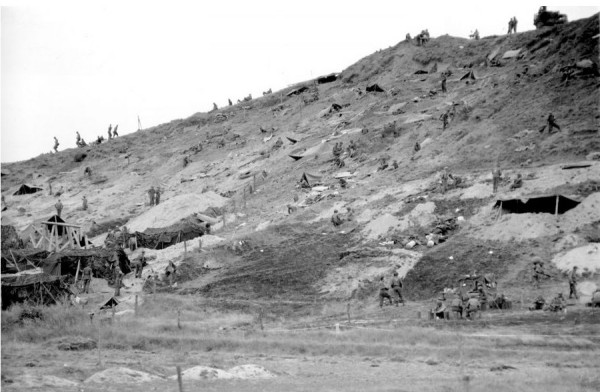
When it comes to history lessons, nothing will ever top my visit to
Cherbourg in France on the same 2010 trip. I got to see the famous Omaha
Beach where the American GIs stormed the cliffs on D-Day.
While everyone else in my group politely stayed with the group to listen
to the guide, I strayed off on my own down to the water's edge a mile
away. I was all by myself standing on the same beach where the soldiers
landed 66 years earlier. As I looked up, I realized the top of the
overlooking bluffs were over a half mile away. The task seemed
impossible. How did they ever do it?
I tried to imagine what raced through the minds of the men that day. I
shuddered at the fear those men must have faced. They were exposed on
the beach with Nazi machine guns up on the bluffs spitting out thousands
of bullets per minute. The GIs wore no armor. There was little for them
hide behind. They knew they could be dead or permanently maimed at any
second. People were dying and screaming all around, yet somehow these
men chose to crawl one inch a time to get to the top of the cliffs!
And once they finally got to the base of the steep hills, things didn't
get any better. From where I was standing, it was still another four
hundred yard climb at a 40 degree angle!!
I had to ask myself if I would have the courage to do the same thing
those men did. It was a very solemn moment for me.
These men knew full well one of those bullets might have their name on
it, but they continued to forge ahead for the sake of American Freedom.
On that day, many young men gave up their lives so that their loved ones
and unborn kids like me could live a life of safety from tyranny. For
crying out loud, these men died so I could live a life of comfort and
ease.
The realization of the true extent of their heroism and sacrifice
overwhelmed me. I broke down and cried right there on the beach. I sat
there sobbing for a good ten minutes. Hell, I am crying again just
writing about it.
I was so overwhelmed by the moment that I completely forgot about the
bus. I was almost 15 minutes late returning to the bus. At first when I
got on the bus, I was embarrassed by all the angry stares. But when I
explained what had happened, everyone got real silent. Slowly they began
to nod their heads. Now they understood completely. Several people began
to cry themselves. I was forgiven.
|
|
http://www.warchronicle.com/16th_infantry/historiantales_wwii/Till_Victory.htm
story of harley
reynolds, another wire blaster, E-1 gap
Colonel S.B. Mason was Chief of Staff for the 1st
Infantry Division during the Normandy invasion. Below is a letter he
sent to the Eleventh Amphibious Force, which assisted the infantry in
the landings at Omaha Beach.
Headquarters 1st US Infantry Division
APO #1, U.S. Army
8 July 1944
Rear Admiral John L. Hall, Commander
Eleventh Amphibious Force
United States Navy
Dear Admiral Hall,
Col. Gibb (G-3) and I made an inspection trip of the OMAHA beaches on
the afternoon of July 6 with the intention of studying the defenses the
Germans had there. Needless to say, on that date, it looked far
different than it did on June 6. That was undoubtedly a strong defensive
position. Manned as it was it should have been impregnable. But there
was one element of the attack which they could not parry. Of course it
is my own opinion, for what it is worth, but I am now firmly convinced
that our supporting Naval fires got us in; that without that gun fire we
positively would not have crossed those beaches.
In Oran we fortunately did not need Naval fires. In Gela we needed and
received same, especially to keep us on position in the face of a
counter-attack which came in prior to our assembling our fire power on
shore. This Normandy beach was different in that we were met on the
beach. I looked over the destruction of German pillboxes, fortified
houses and gun positions, and in all cases it was apparent that Naval
guns had worked on them.
I still think “One” and “One One” make a good team. More than ever I am
in a position to appreciate your support, and if we ever have to do
another of these jobs, we will all hope for the good fortune of being
teamed with 11th Amphib for planning and execution.
General Huebner concurs in the above and joins me in best regards to you
and your staff.
Respectfully,
S.B. Mason
Chief of Staff
A Killing Machine
Severloh took 40 years to begin to process what happened to him
on Omaha Beach. He had taken up a concealed position on the
eastern side of the beach along with 30 other German soldiers,
and he recalls watching the horizon turn black with dozens of
ships and landing craft racing for the shore. His commanding
officer, Lt. Bernhard Frerking, had told him not to open fire
until the enemy reached knee-deep level, where he could get a
full view.
"What came to mind was, 'Dear God, why have you abandoned me?' "
he recalled. "I wasn't afraid. My only thought was, 'How can I
get away from here?' "
But rather than run, Severloh slipped the first belt of
ammunition into his MG-42 machine gun and opened fire. He could
see men spinning, bleeding and crashing into the surf, while
others ripped off their heavy packs, threw away their carbines
and raced for the shore. But there was little shelter there.
Severloh said he would occasionally put down the machine gun and
use his carbine to pick off individual men huddled on the beach.
He is still haunted by a soldier who was loading his rifle when
Severloh took aim at his chest. The bullet went high and hit the
man in the forehead.
"The helmet fell and rolled over in the sand," Severloh said.
"Every time I close my eyes, I can see it."
Severloh said he was the last man firing from his position. By
mid-afternoon, his right shoulder was swollen and his slender
fingers were numb from constant firing. When a U.S. destroyer
pinpointed his position and began to shell it, he fled to the
nearby village of Colleville-Sur-Mer, where he was captured that
evening.
In Severloh's telling of D-Day, there are few heroes and several
surprises. The German occupiers had warm relations with their
French farm hosts before the invasion, he contends. Lt. Frerking,
who died on D-Day, was an honorable man who spoke fluent French
and once gave one of his men 10 days' punishment for failing to
help an elderly French woman with her shopping bags, Severloh
said. The U.S. invaders slaughtered farm animals and soldiers,
he said, yet that evening he and his ravenous U.S. captors
shared a baguette.
Severloh said he first told his tale to an inquisitive
correspondent for ABC News during the 40th anniversary of D-Day
in 1984. But the real breakthrough came when an amateur war
historian named Helmut Konrad von Keusgen tracked Severloh down.
Von Keusgen, a former scuba diver and graphic artist, said he
had heard from U.S. veterans about the machine gunner they
called the "Beast of Omaha Beach" because he had mowed down
hundreds of GIs that day. Severloh confessed he was that gunner.
Von Keusgen ghost-wrote Severloh's memoirs, published in 2000,
and still visits him regularly.
The two men contend that Severloh might have shot more than
2,000 GIs. That's an impossible figure, according to German and
American historians, who say that although the numbers are far
from exact, estimates are that about 2,500 Americans were killed
or wounded by the 30 German soldiers on the beach.
"My guess is yes, he helped kill or wound hundreds, but how many
hundreds would be hard to say," Roger Cirillo, a military
historian at the Association of the U.S. Army in Arlington,
wrote in an e-mail. He added: "Omaha is like Pickett's Charge.
The story has gotten better with age, though no one doubts it
was a horror show. Men on both sides were brave beyond reason,
and this is the sole truth of the story."
Hein Severloh said he takes no pride in what he did, but telling
his tale has given him a sense of relief.
"I have thought about it every single day that God gave to me,"
he said. Now, he said, "the pressure is gone."
http://www.washingtonpost.com/wp-dyn/articles/A10191-2004Jul23_2.html |
| http://johnsmilitaryhistory.com/Colleville.html
http://www.wehrmacht-awards.com/forums/showthread.php?t=248925&page=8
|
There
is
another
bit
of
interesting
info
to
surface
from
Severloh's
book.
His
description
of
talking
to a
GI
in
his
native
Platt
Deutsch
dialect
and
their
subsequent
surrender
to
captured
Americans
who
then
take
a
fairly
sizable
group
of
them
as
they
were
surrounded
also
checks
out.
In
1993,
I
remember
Al
Smith,
Exec
of
3-16
Infantry
and
a
Company
CO
in
North
Africa
and
Sicily
related
a
story
to
me
which
I
subsequently
verified
in
the
division
archives.
Company
L,
16th
Infantry,
1st
Division
US,
landed
as
one
of
the
original
8
assault
companies
in
the
first
wave.
After
heavy
casualties
and
a
stiff
fight,
a
perimeter
of
sorts
had
been
formed
by
0900.
CPT
Armellino
was
seriously
wounded
and
the
company
exec,
1LT
Cutler,
assumed
command.
Cutler
ordered
a
three
man
patrol
of
Privates
Milander,
Butts
and
Odell
ahead
on a
recon
toward
the
bluff
hamlet
of
Cabourg.
Later,
the
company
was
able
to
penetrate
further
east
of
WN
62
and
up
the
F-1
draw
through
WN
60
when
1LT
Jimmy
Monteith
led
a
tank
up
the
draw
exposing
himself
to
murderous
fire.
The
attack
succeeded
and
Monteith
was
later
killed
when
CPT
Kim
Richmond's
Company
I
gained
the
field
east
of
the
draw
and
Monteith
was
consolidating
his
element.
Monteith
would
be
awarded
the
Medal
of
Honor.
Meanwhile,
the
three
man
patrol
never
made
it.
They
were
captured.
However,
that
night,
they
returned
with
a
large
group
of
German
prisoners.
Private
Milander
had
talked
them
into
surrendering
after
they
realized
the
strength
of
the
American
landing
and
the
penetrations
already
made
beyond
the
beach.
I
have
often
wondered
if
this
is
two
parts
of
the
same
story.
It
may
be
possible
that
Milander
was
the
individual
who
spoke
Platt
Deutsch.
Anyway,
I
just
find
it
amazing
that
Severloh
would
mention
being
talked
into
handing
themselves
over
to a
few
Americans
as
they
were
already
surrounded
and
then
you
have
the
Milander,
Butts
and
Odell
story.
Seems
to
check
out.
Steve
|
|
|
|
http://www.worldwariihistory.info/Medal-of-Honor/D-Day.html
medal of honor winners on dday |
|
The Spalding
Interview
(Rick Archer's Note:
Unfortunately, there were several contradictions on what happened
with Spalding's group during the assault on the hill. One
contradiction involved who got to the top first. Was it
Spalding or Dawson? Another contradiction involved the heroic
effort to cut through the barbed wire, an act of bravery straight
out of a WW II movie. Did Phillip Streczyk cut the wire with
snippers or did Curtis Colwell blow a hole in it with a bangalore
torpedo? I was unable to answer either question.
My point is simple - I
have to rely on other people's report to tell the story as best I
can. However I cannot promise complete accuracy. Plus I
intend to paraphrase some of the details to make it easier to read.
If that is okay with the reader, then here comes a great story.
http://www.warchronicle.com/16th_infantry/historiantales_wwii/Till_Victory.htm
|
by S. L. A. Marshall
First Wave at Omaha Beach
UNLIKE what happens to other great battles, the passing of the years and
the retelling of the story have softened the horror of Omaha Beach on D
Day.
This fluke of history is doubly ironic since no other decisive battle
has ever been so thoroughly reported for the official record. While the
troops were still fighting in Normandy, what had happened to each unit
in the landing had become known through the eyewitness testimony of all
survivors. It was this research by the field historians which first
determined where each company had hit the beach and by what route it had
moved inland. Owing to the fact that every unit save one had been
mislanded, it took this work to show the troops where they had fought.
How they fought and what they suffered were also determined in detail
during the field research. As published today, the map data showing
where the troops came ashore check exactly with the work done in the
field; but the accompanying narrative describing their ordeal is a
sanitized version of the original field notes.
This happened because the Army historians who wrote the first official
book about Omaha Beach, basing it on the field notes, did a calculated
job of sifting and weighting the material. So saying does not imply that
their judgment was wrong. Normandy was an American victory; it was their
duty to trace the twists and turns of fortune by which success was won.
But to follow that rule slights the story of Omaha as an epic human
tragedy which in the early hours bordered on total disaster. On this
two-division front landing, only six rifle companies were relatively
effective as units. They did better than others mainly because they had
the luck to touch down on a less deadly section of the beach. Three
times that number were shattered or foundered before they could start to
fight. Several contributed not a man or bullet to the battle for the
high ground. But their ordeal has gone unmarked because its detail was
largely ignored by history in the first place. The worst-fated companies
were overlooked, the more wretched personal experiences were toned down,
and disproportionate attention was paid to the little element of
courageous success in a situation which was largely characterized by
tragic failure.
The official accounts which came later took their cue from this
secondary source instead of searching the original documents. Even such
an otherwise splendid and popular book on the great adventure as
Cornelius Ryan's The Longest Day misses the essence of the Omaha story.
|
US Army MH:
US Army
Military History: Elements of three
companies shared in the assault on the bluffs between
the E-1 and E-3 draws (gaps
btw the hills).
At this part of Easy Red between the
strong points, the beach shelf above the shingle
embankment is more than a hundred yards wide, with areas
of swamp along the inland edge of the flat.
US Army MH:
One hundred and thirty feet high on this sector, the bluff is
reached by traveling
200 yards of moderate slope, patched with heavy bush.
Five hundred yards west of E-3, a small
draw led up at a slight angle to the west, forming a possible
corridor for advance to the bluff crest (spalding/dawson
rte).
Below the draw on the flat was a ruined house.
The 1st Section of Company E, 16th Infantry, and two of the
scattered sections of E, 116th, had come to shore here in the first
wave.
The 16th's unit, led by 2d Lt. John Spalding, blew a gap in the wire
above the shingle, made its way past the house, and then was held up
by minefields in the marshy ground at the foot of the slopes.
On the beach, intense small-arms fire came from an
emplacement to the left, in the E-3 strongpoint (WN
62). Spalding's men landed (0645) and
found a way past the mines. Now they
began to work up the slope, using the visual
protection afforded by the small draw (the
viewing hollow). To the west, and out of contact, the two
sections from the 116th had cut the wire and dashed across the flat,
but mines stopped them near the start of the hillside and they took
shelter in a ditch. A soldier who went ahead to clear a path by use
of a bangalore was killed by an antipersonnel mine.
Their progress was delayed.
Meanwhile Company G (Dawson) of the 16th
RCT had landed (0700) and had reached the embankment in good order.
G Company's
machine guns, set up behind the shingle, found no targets until
landing craft of the 1st Battalion, coming
toward the beach (about 0730), drew enemy fire from 8 or 10 small
emplacements along the half mile of bluff. While the heavy weapons
built up a volume of supporting fire, a few men from each section
blew gaps in the extensive double-apron and concertina wire beyond
the shingle. Their work was made more difficult by anti-personnel
mines set to detonate by trip wires.
Four bangalores were required to cut one lane. Engineers of Company
A, 1st Engineer Combat Battalion and Company C, 37th Engineer Combat
Battalion helped in clearing and marking the lanes. When G
Company's men reached the slopes they came in contact with
Lieutenant Spalding's section of E and two other
sections of the 116th.
In an effort to coordinate the advance, an
arrangement was made with these units to operate on Company G's
right.
The mined areas, in which a part of the mines were faked, slowed up
every unit that crossed the beach, then and for some time. Company G
found one route through the mines by going over the dead bodies of
two soldiers who had been caught there earlier. While the company
was making its way across the flat, bothered more by the minefields
than enemy fire, Capt. Joseph T. Dawson and one man went on ahead.
When they were halfway up the hill, an
enemy machine gun at the head of the small draw forced Dawson into
cover. He sent his companion back to bring up the company and
crawled on from one patch of brush to another. By the time he was 75
yards from the gun, the enemy lost sight of him. Circling
to his left, he came to the military crest a little beyond the
machine gun, and got within 30 feet before the Germans spotted him
and swung their weapon around. Dawson threw a fragmentation grenade
which killed the crew.
This action opened the way up the little
draw, but it took some time to get the company up as a result of
disorganization suffered in crossing the beach flat. The 5th
Section, first to arrive, knocked out two more machine guns and took
a prisoner. On the whole, enemy opposition had not been heavy, and
cover on the slopes allowed Company G to make the crest with few
casualties.
Their movement forward, from embankment to
the bluff top, had taken place between 0730 and 0830. Enemy fire
died away as the troops emerged on the fields of the upland,
reorganized, and started south in column of sections. Their
principal concern was with the frequent indications of mined areas
just beyond the bluff top.
To their right, Lieutenant Spalding's
section of Company E, 16th RCT, was getting up about the same time,
helped by covering fire from Dawson's
Company G, and effecting a useful extension of the front of
penetration. The section now numbered 3 men, having lost 3 at the
beach and 3 more getting past an enemy machine gun on the bluff
side.
The gun was operated by a lone soldier who
was captured and found to be Polish. He informed Spalding that there
were 16 enemy in trenches to his rear. The Company E section got to
the trenches, sprayed them with fire and found the Germans had
withdrawn.
Spalding turned west along the bluff crest, losing contact with
Company G as that unit headed south. Moving through hedgerow fields
and wooded areas, the Company E group came up on the rear of the
strongpoint guarding E-1 draw (WN64).
The Germans were manning trenches overlooking the beach, and attack
from the high ground caught them by surprise. In
two hours of confused fighting, Spalding's men got through the
outworks of this strongpoint and overcame
opposition by close-in work with grenades and rifles.
Naval fire hitting in the parts of the strong-point below the bluff
top also helped to demoralize the
resistance. Twenty-one prisoners were taken, and several enemy
killed, without any loss to the attackers.
Although the fortified area was too extensive to be thoroughly
cleaned out by Spalding's small force, WN 64,
the strongpoint east of E-1 had been effectively neutralized
by midmorning, just when important reinforcements for the
assault were beginning to land in front of the draw.
At about 1100,
Spalding's section was joined by some other elements of Company E,
which had come up from further east. They brought word from
battalion to head south for Colleville.
The area opened up by Company G became a funnel for movement off
the beach during the rest of the morning.
USAMH
|
D-Day:
Afternoon on Omaha Beach
What
Hitler Did Wrong
Converted for the Web from "D-Day:
June 6, 1944: The Climactic Battle of World War II"
by
Stephen E. Ambrose
Jump to:
Afternoon on Omaha Beach |
Landing on Omaha Beach
Correspondent Ernest Hemingway | What Hitler Did
Wrong |
What Eisenhower Did Right
There was no German counterattack. Rommel's plans for
fighting the D-Day battle were never put into motion.
There were many reasons.
First, German surprise was complete. The Fortitude
operation had fixed German attention on the
Pas-de-Calais. They were certain it would be the site of
the battle, and they had placed the bulk of their panzer
divisions north and east of the Seine River, where they
were unavailable for counterattack in Normandy.
Second, German confusion was extensive. Without air
reconnaissance, with
Allied airborne troops dropping here, there,
everywhere, with their telephone lines cut by the
Resistance, with their army, corps, division, and some
regimental commanders at the war game in Rennes, the
Germans were all but blind and leaderless. The commander
who was most missed was Rommel, who spent the day on the
road driving to La Roche-Guyonan -- another price the
Germans paid for having lost control of the air; Rommel
dared not fly.
Third, the German command structure was a disaster.
Hitler's mistrust of his generals and the generals'
mistrust of Hitler were worth a king's ransom to the
Allies. So were Hitler's sleeping habits, as well as his
Wolkenkuckucksheim ideas.
The only high-command officer who responded correctly to
the crisis at hand was Field Marshal Rundstedt, the old
man who was there for window dressing and who was so
scorned by Hitler and OKW. Two hours before the seaborne
landings began, he ordered the two reserve panzer
divisions available for counterattack in Normandy, the
12th SS Panzer and Panzer Lehr, to move immediately
toward Caen. He did so on the basis of an intuitive
judgment that the airborne landings were on such a large
scale that they could not be a mere deception maneuver
(as some of his staff argued) and would have to be
reinforced from the sea. The only place such landings
could come in lower Normandy were on the Calvados and
Cotentin coasts. He wanted armor there to meet the
attack.
Rundstedt's reasoning was sound, his action decisive,
his orders clear. But the panzer divisions were not
under his command. They were in OKW reserve. To save
precious time, Rundstedt had first ordered them to move
out, then requested OKW approval. OKW did not approve.
At 0730 Jodi informed Rundstedt that the two divisions
could not be committed until Hitler gave the order, and
Hitler was still sleeping. Rundstedt had to countermand
the move-out order. Hitler slept until noon.
The two panzer divisions spent the morning waiting.
There was a heavy overcast; they could have moved out
free from serious interference from Allied aircraft. It
was 1600 when Hitler at last gave his approval. By then
the clouds had broken up and Allied fighters and bombers
ranged the skies over Normandy, smashing anything that
moved. The panzers had to crawl into roadside woods and
wait under cover for darkness before continuing their
march to the sound of the guns.
"The news couldn't be better," Hitler said when he was
first informed that D-Day was here. "As long as they
were in Britain we couldn't get at them. Now we have
them where we can destroy them." He had an appointment
for a reception near Salzburg for the new Hungarian
prime minister; other guests included diplomats from
Bulgaria,
Romania, and
Hungary. They were there to be browbeaten by Hitler
into doing even more for the German war economy. When he
entered the reception room, his face was radiant. He
exclaimed, "It's begun at last." After the meeting he
spread a map of
France and told Goering, "They are landing here --
and here: just where we expected them!" Goering did not
correct this palpable lie.
Nazi propaganda minister Goebbels had been told of the
Allied airborne landings at 0400. "Thank God, at last,"
he said. "This is the final round."
Goebbels's and Hitler's thinking was explained by one of
Goebbels's aides, who had pointed out in an April 10,
1944, diary entry: "The question whether the Allied
invasion in the West is coming or not dominates all
political and military discussion here.
"Goebbels is afraid that the Allies dare not make the
attempt yet. If so, that would mean for us many months
of endless, weary waiting which would test our strength
beyond endurance. Our war potential cannot now be
increased, it can only decline. Every new air raid makes
the petrol position worse." It had been galling to the
Nazis that the Allies had been able to build their
strength in
England, untouchable by the Luftwaffe or the
Wehrmacht. Now they had come within range of German
guns.
But Hitler was more eager to hit London than to fight a
defensive war. He had a weapon to do it with, the V-1.
It had first been flown successfully on Christmas Eve,
1943; by June
1944, it was almost ready to go to work. The V-1 was
a jet-powered plane carrying a one-ton warhead. It was
wildly inaccurate (of the 8,000 launched against London,
only 20 percent even hit that huge target), but it had a
range of 250 kilometers and flew at 700 kilometers per
hour, too fast for Allied aircraft or antiaircraft to
shoot down.
On the afternoon of June 6, Hitler ordered the V-1
attacks on London to begin. As was so often the case, he
was giving an order that could not be carried out. It
took six days to bring the heavy steel catapult rigs
from their camouflaged dumps to the Channel coast. The
attack did not begin until June 12, and when it did it
was a fiasco: of ten V-1s launched, four crashed at
once, two vanished without a trace, one demolished a
railway bridge in London, and three hit open fields.
Still, the potential was there. Fortunately for the
Allies, Hitler had picked the wrong target. Haphazard
bombing of London could cause sleepless nights and
induce terror, but it could not have a direct military
effect. Had Hitler sent the V-1s against the beaches and
artifical harbors of Normandy, by June 12 jammed with
men, machines, and ships, the vengeance weapons
(Goebbels picked the name, which was on the mark -- they
could sate Hitler's lust for revenge but they could not
effect the war so long as they were directed against
London) might have made a difference.
http://www.worldwar2history.info/D-Day/Hitler.html
PICTURES COMPARING THEN AND NOW
Rick, these should fit right in
to your blog and your studies. ~Jim
These a amazing photos. Someone
really did they homework planning these
out. Very hard to believe the course of time.
http://www.ibtimes.co.uk/d-day-landing-sites-then-now-normandy-beaches-1944-70-years-later-1450286
.D-Day nearly scrapped exercise
tiger
The deadly ambush left Allied commanders
rattled. Ten U.S. officers with detailed
knowledge of the looming Normandy invasion were
missing and the possibility that any of them
been taken prisoner on the German E-boats was a
major concern. Scrapping "Operation Overlord,"
the name given to the D-Day landings, was
discussed at the highest levels.
But the emergency ended when all ten bodies were
eventually recovered. The German crews had no
idea they had stumbled upon a secret test run
for the Normandy invasion.
http://www.nbcnews.com/id/30977039/ns/world_news-d_day_65_years_later/t/disaster-may-have-saved-d-day/
.
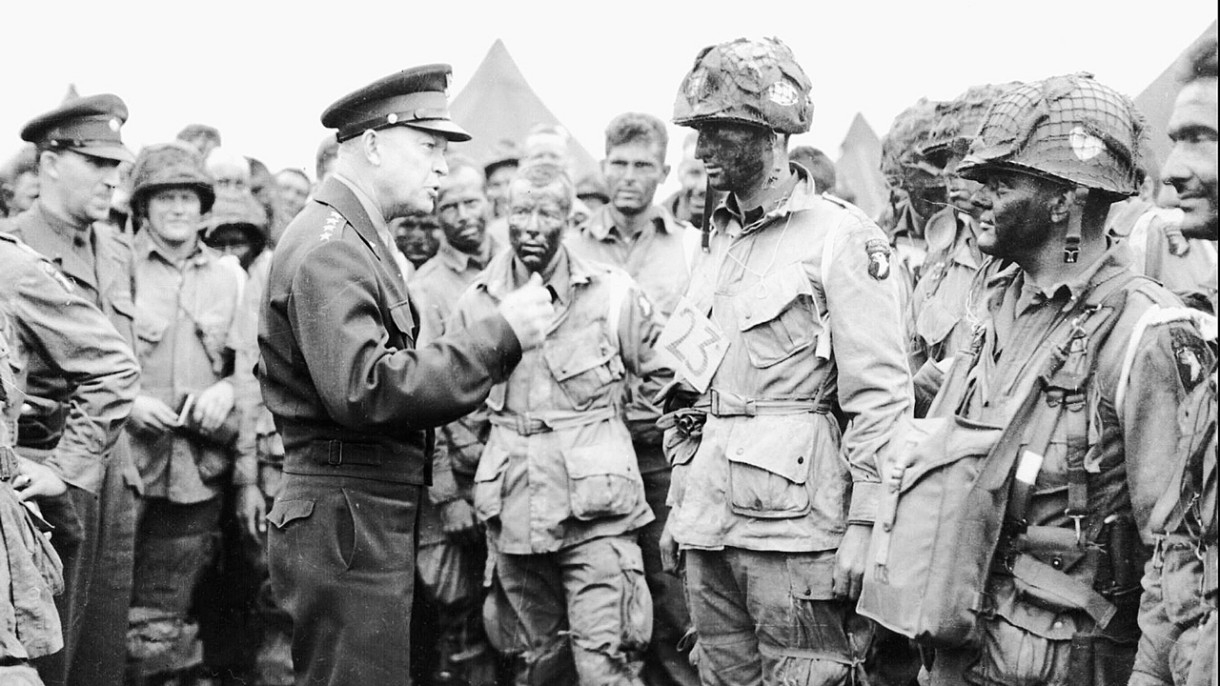 |
|